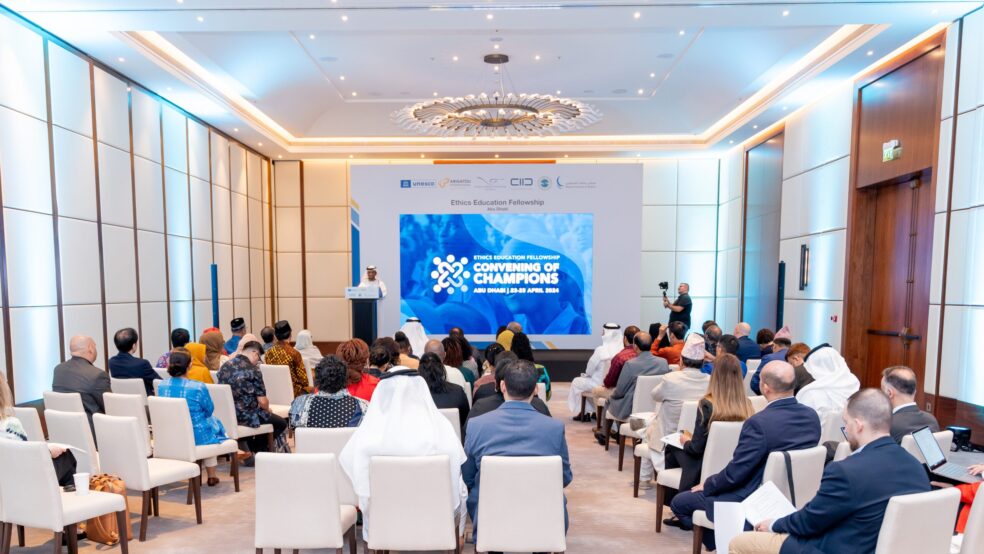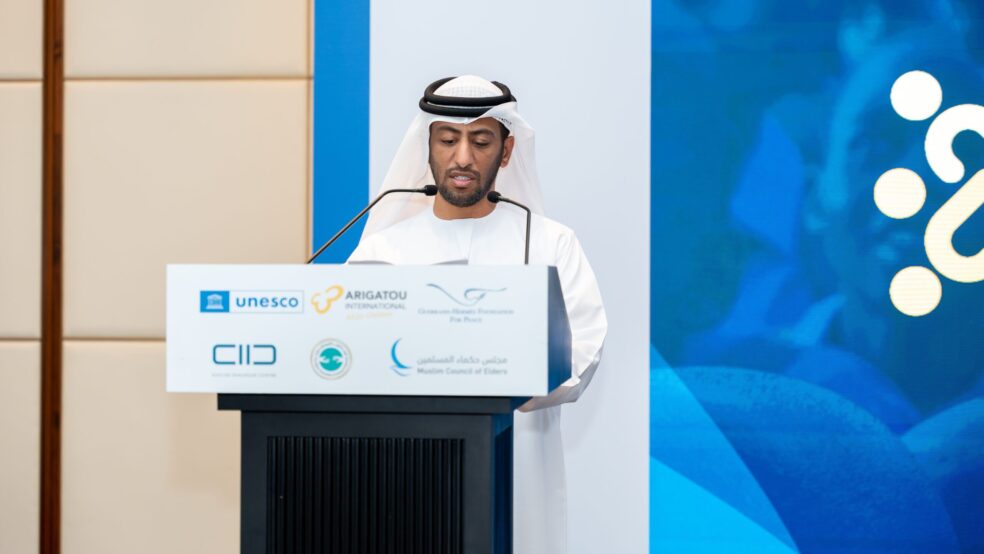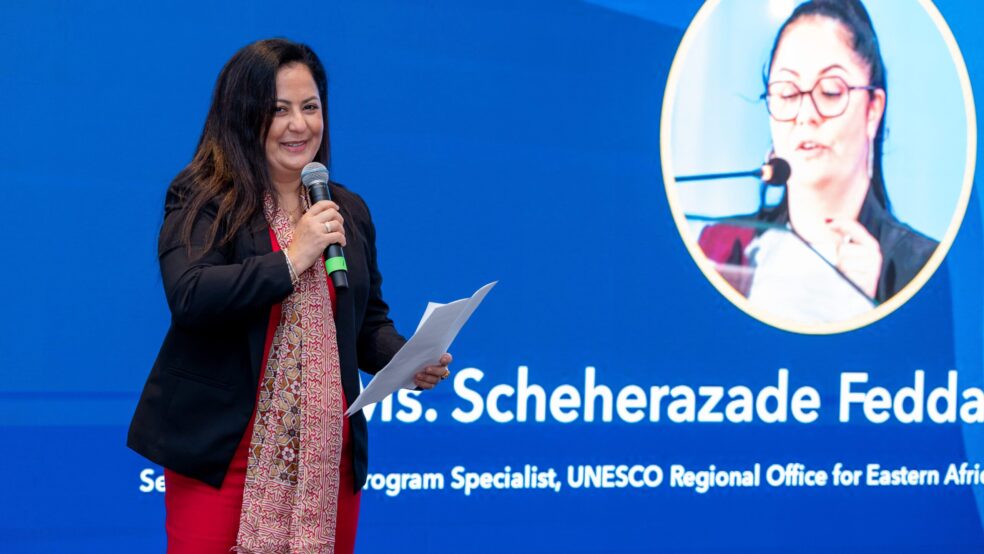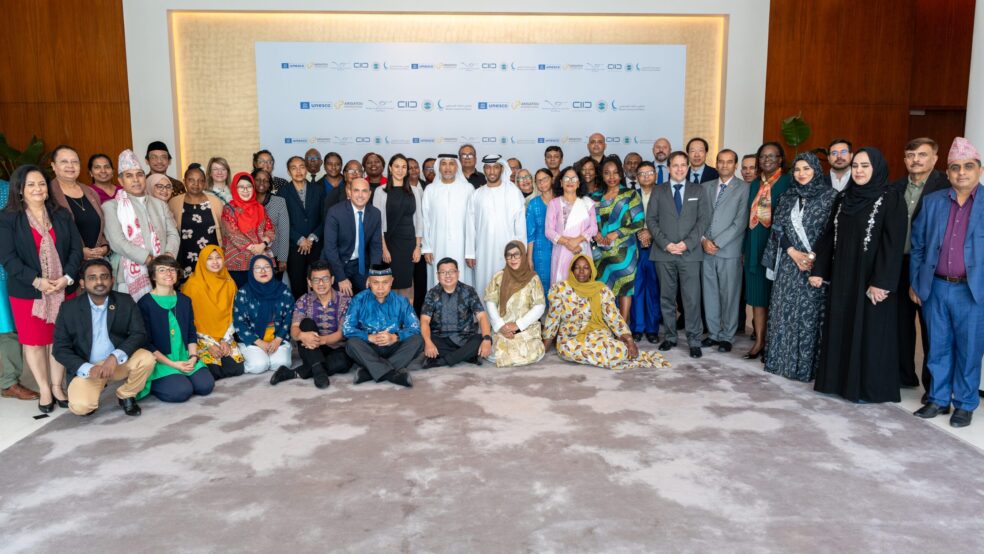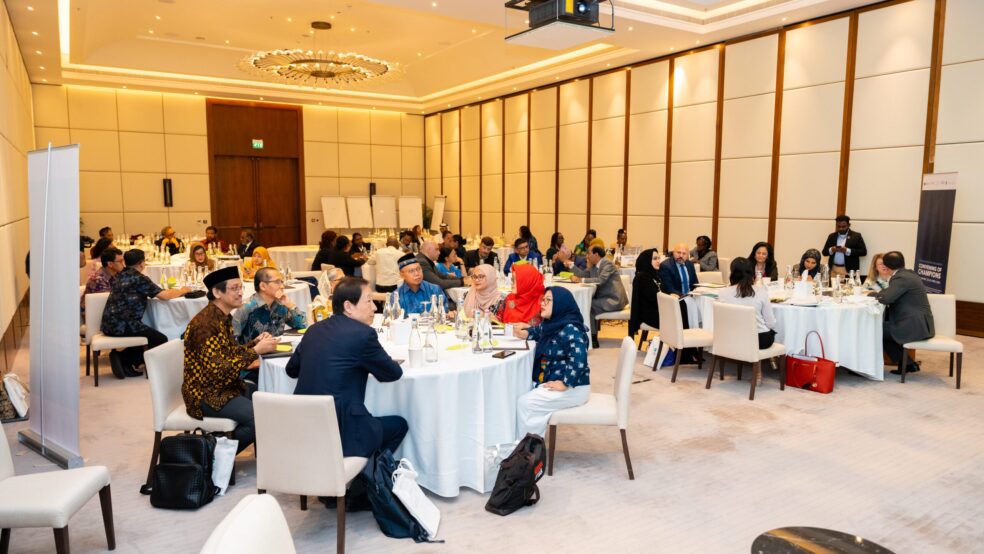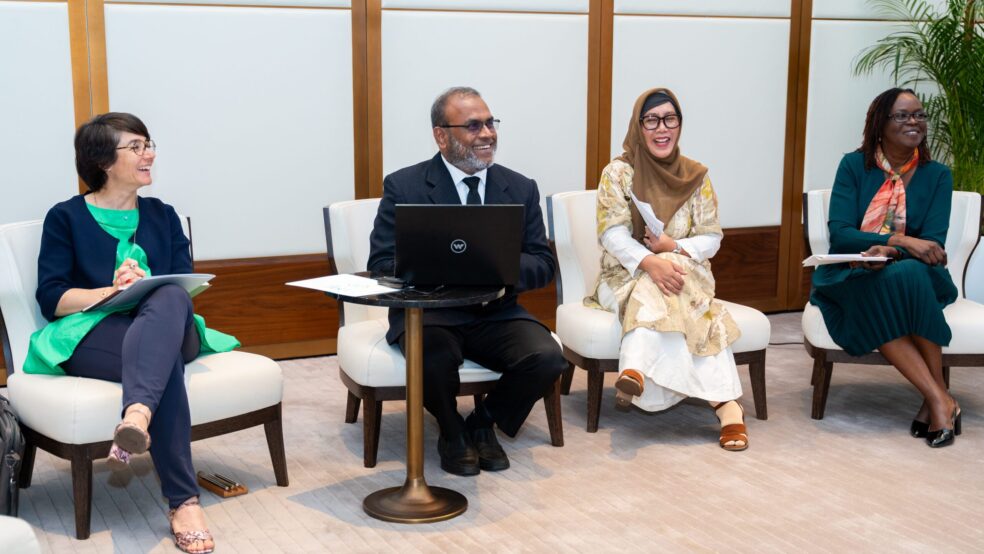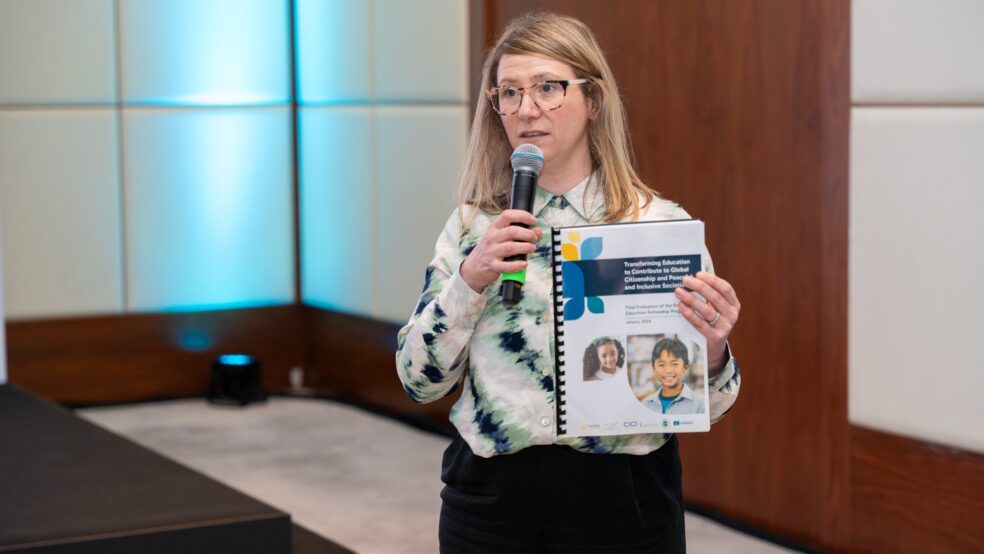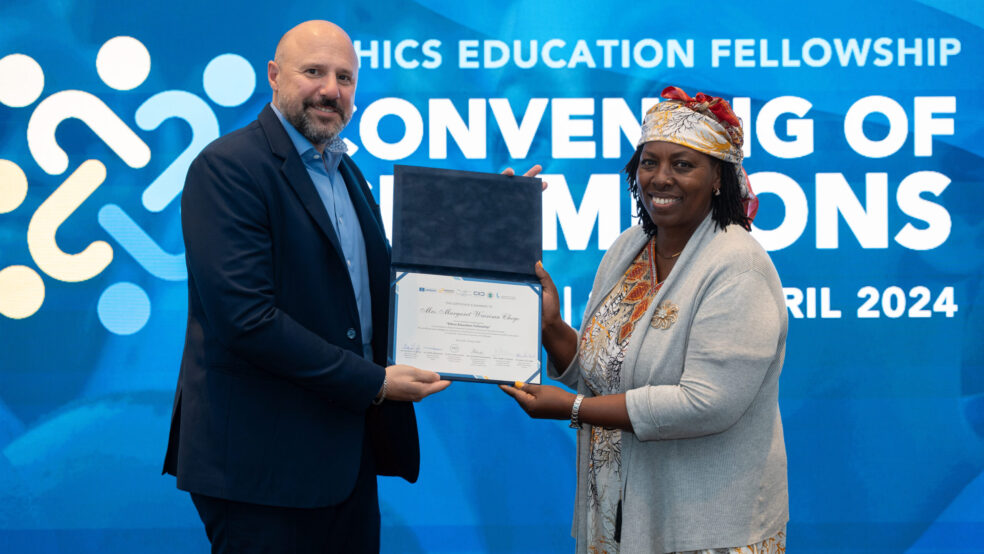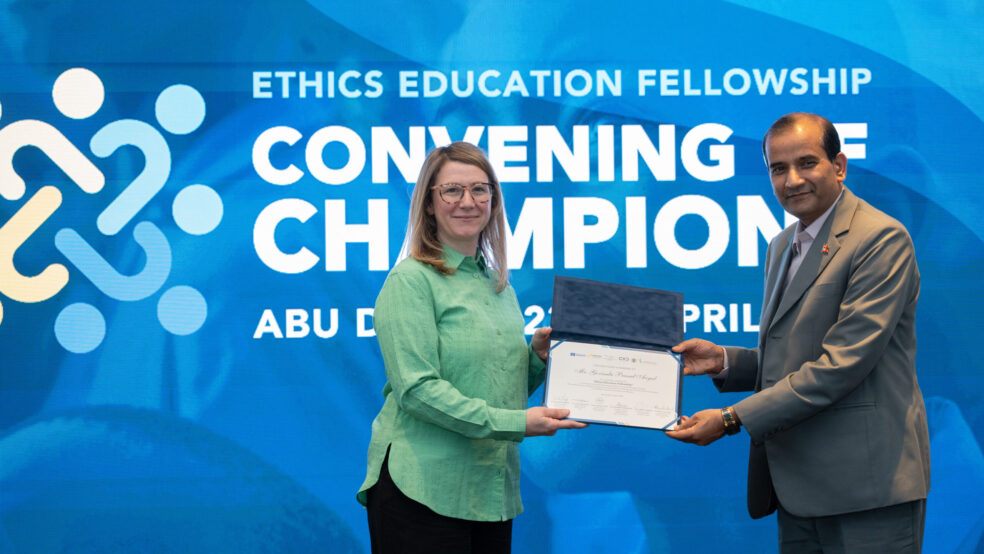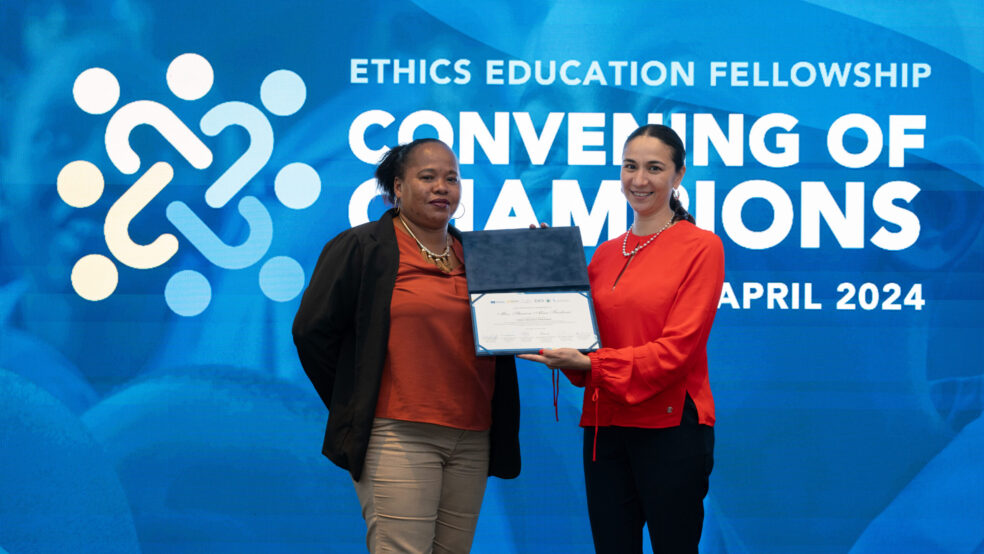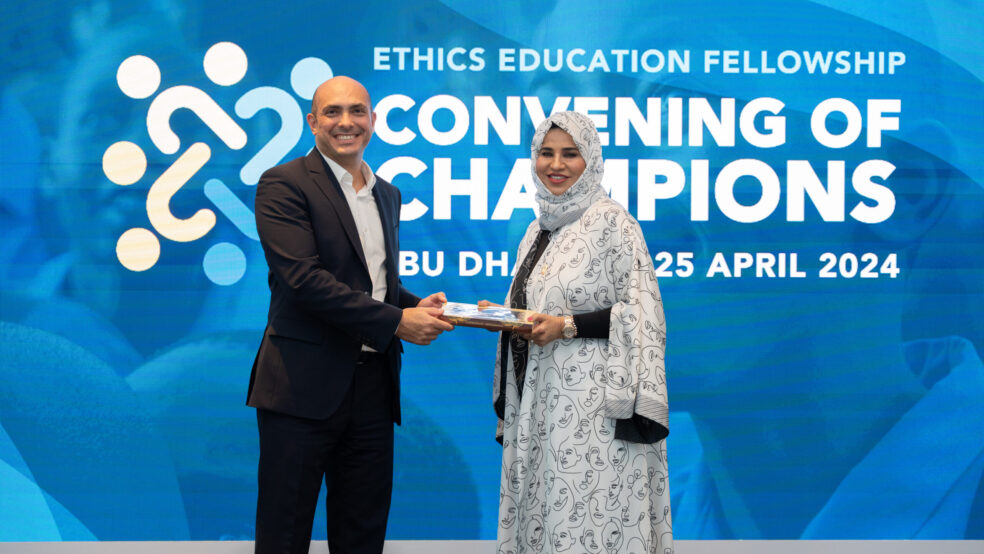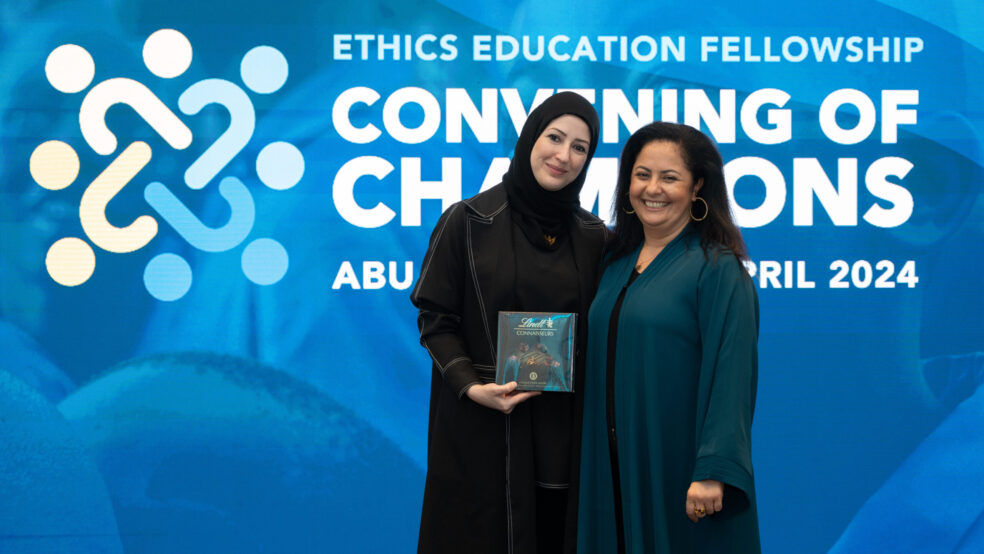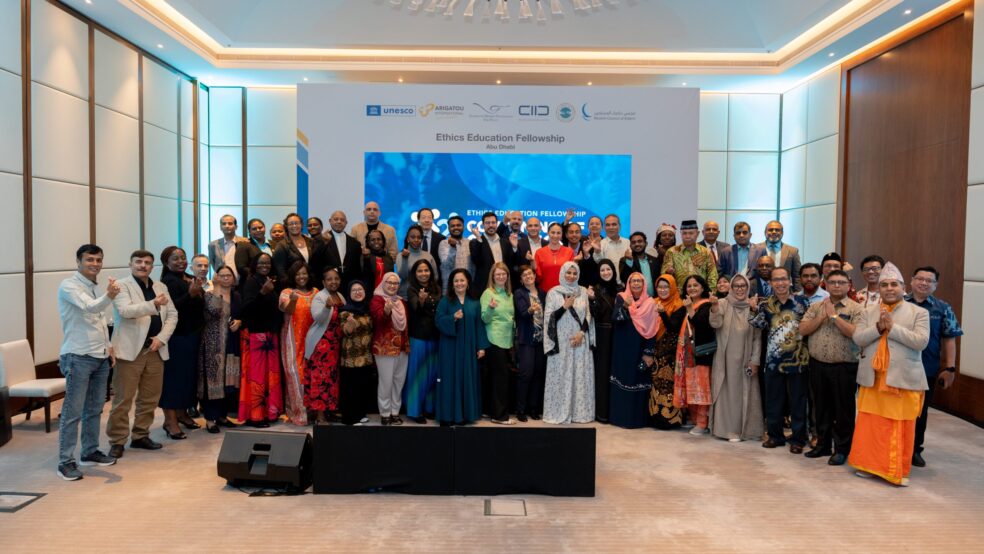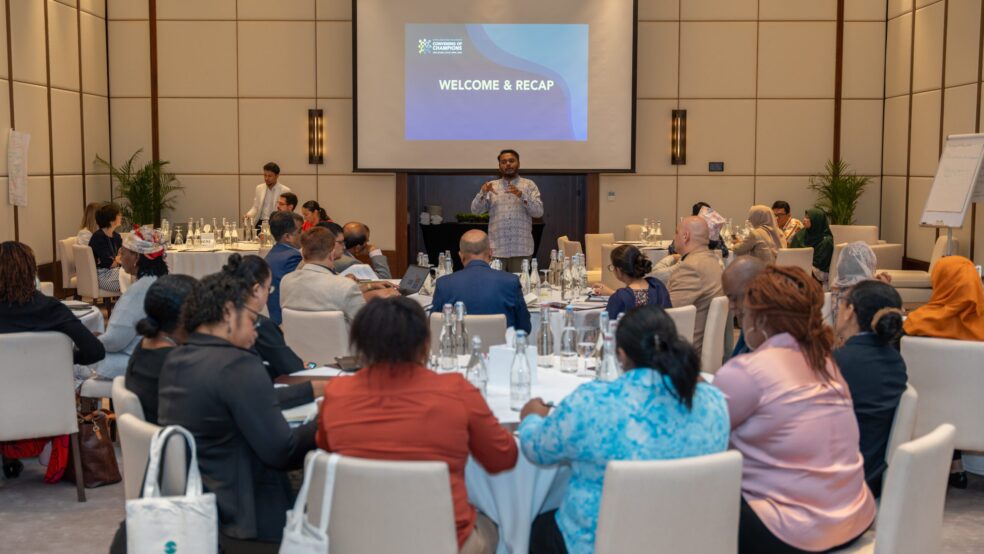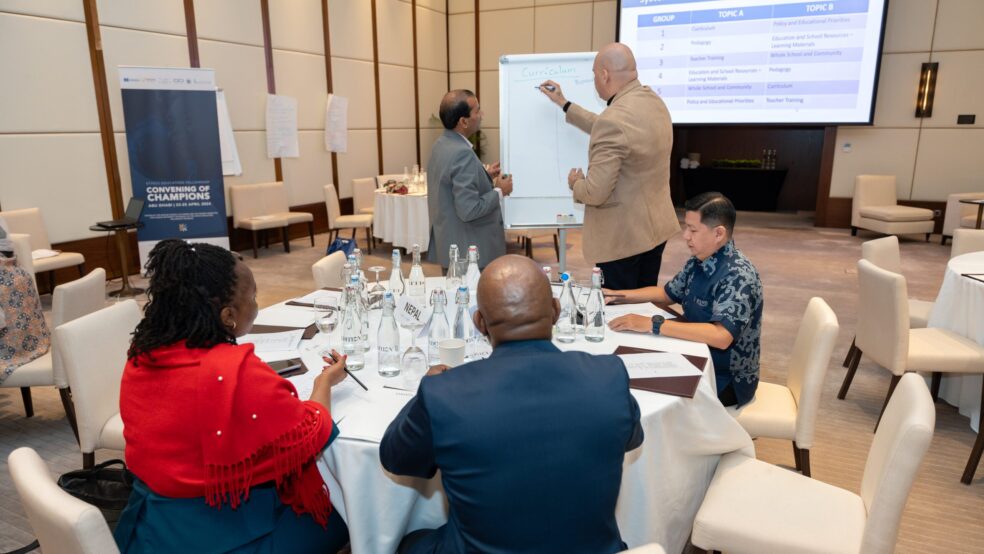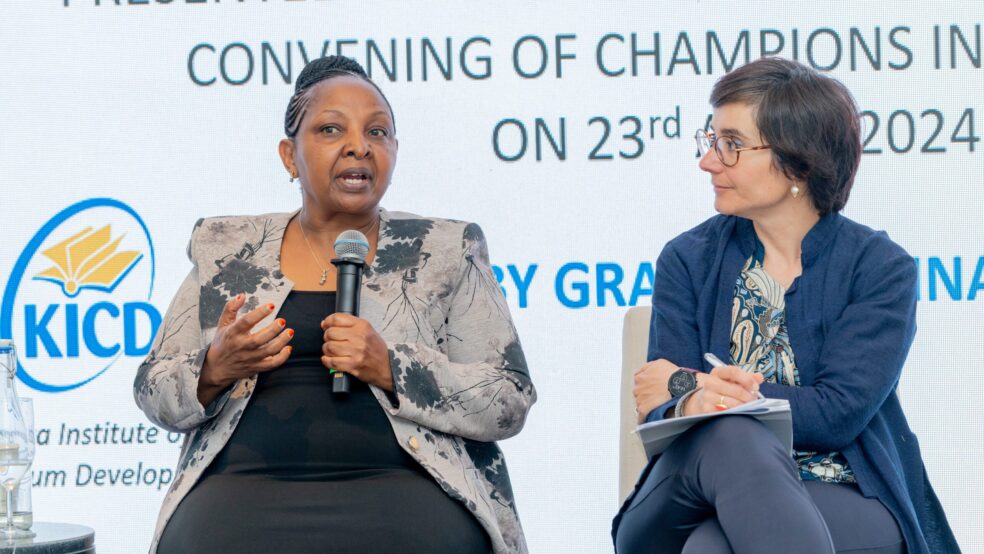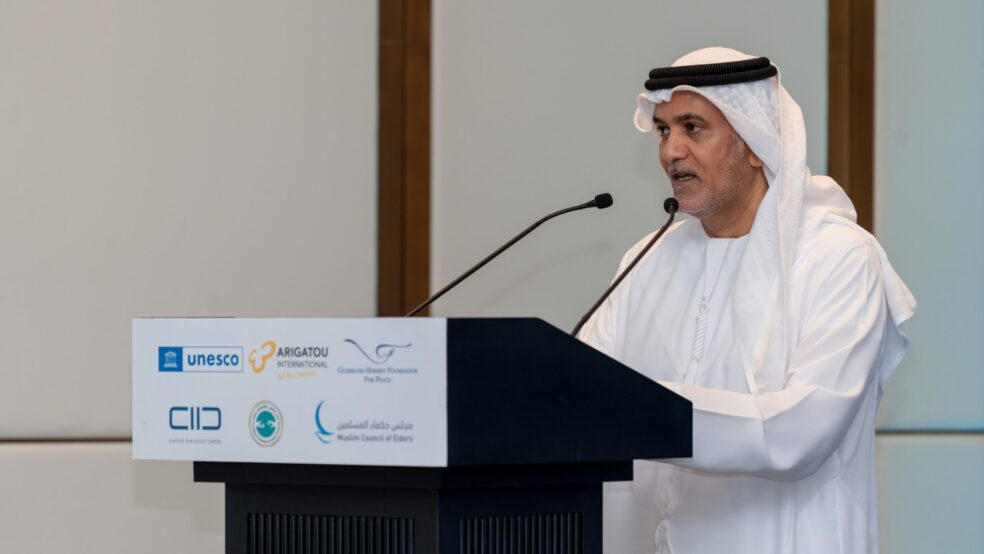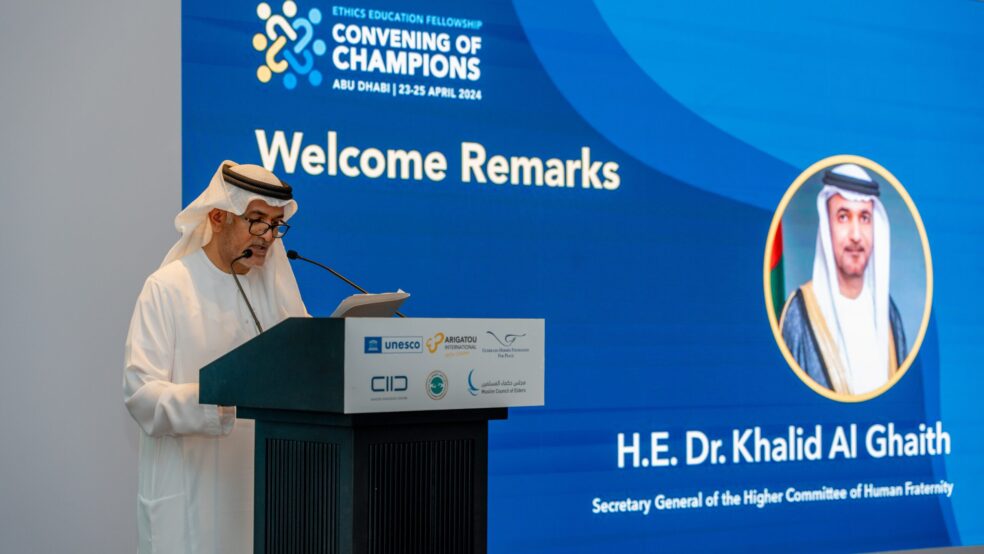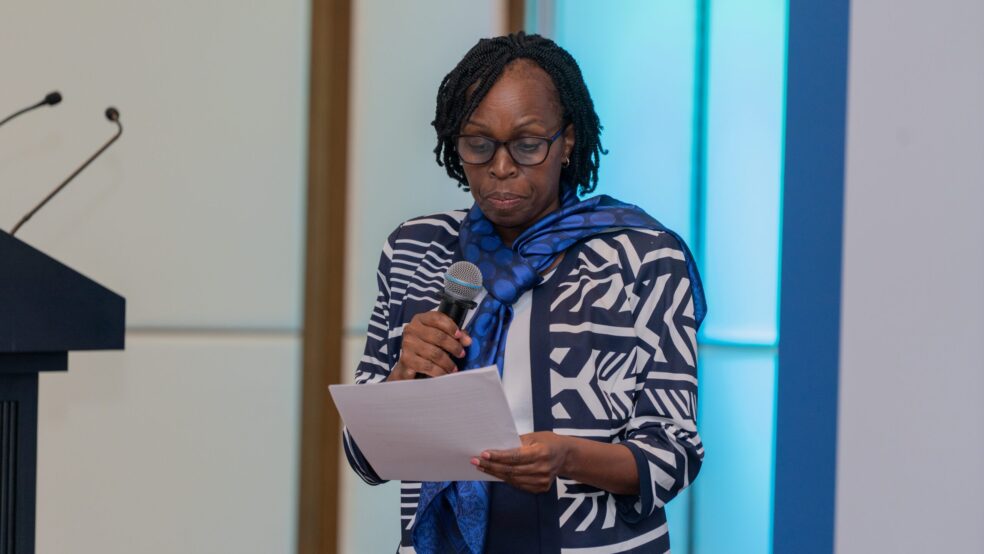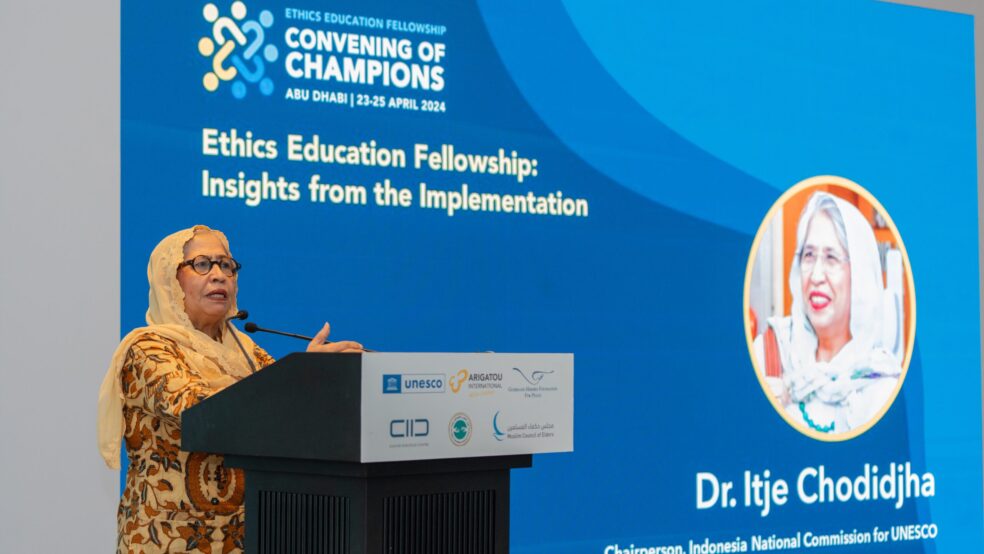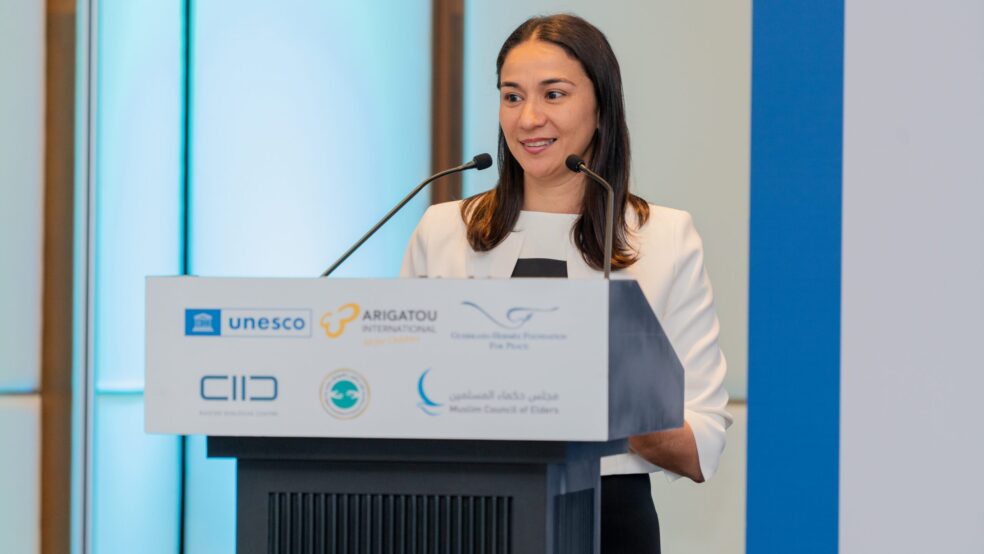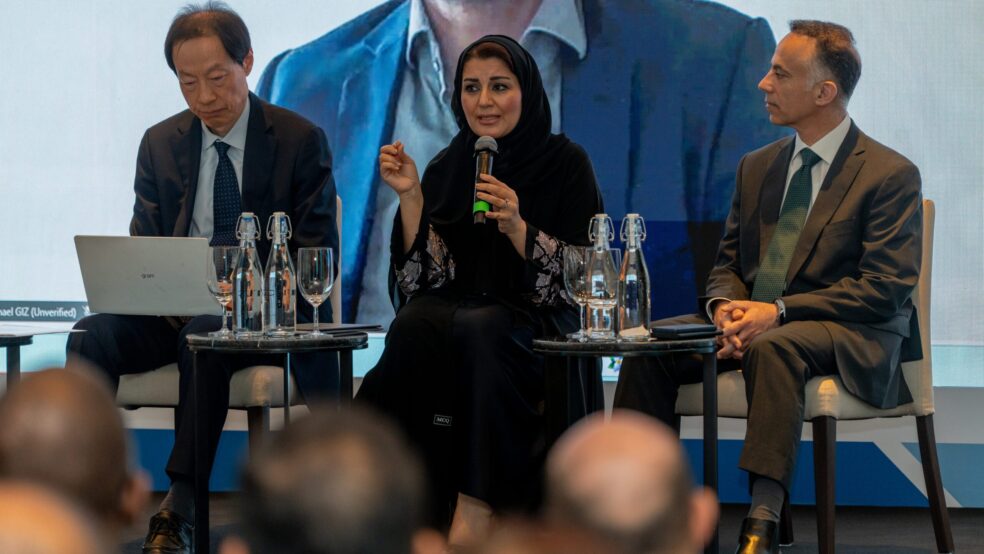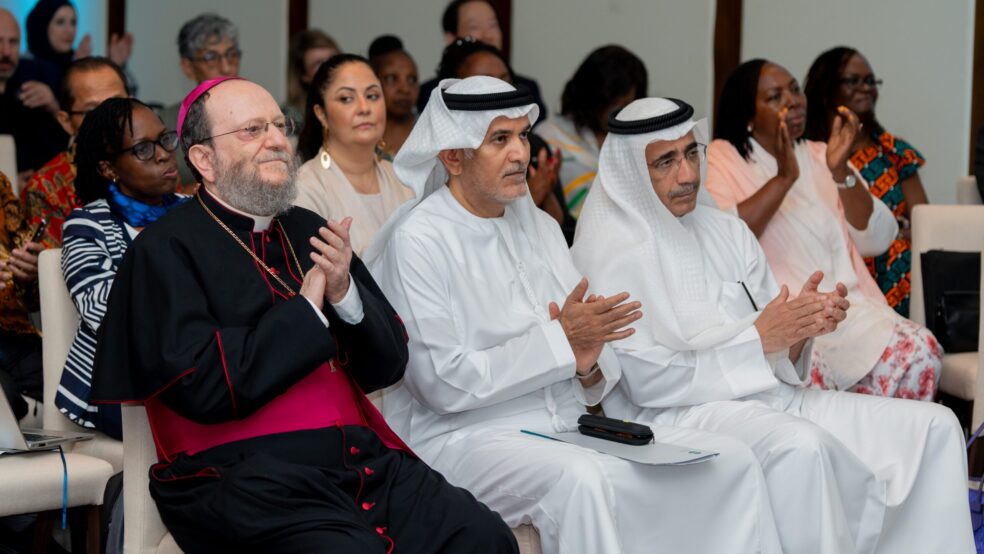30/08/2024 - Groundbreaking Training Workshop Launched in Tanzania to Nurture Spiritual Development in Early Childhood
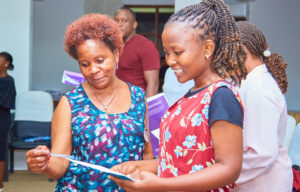
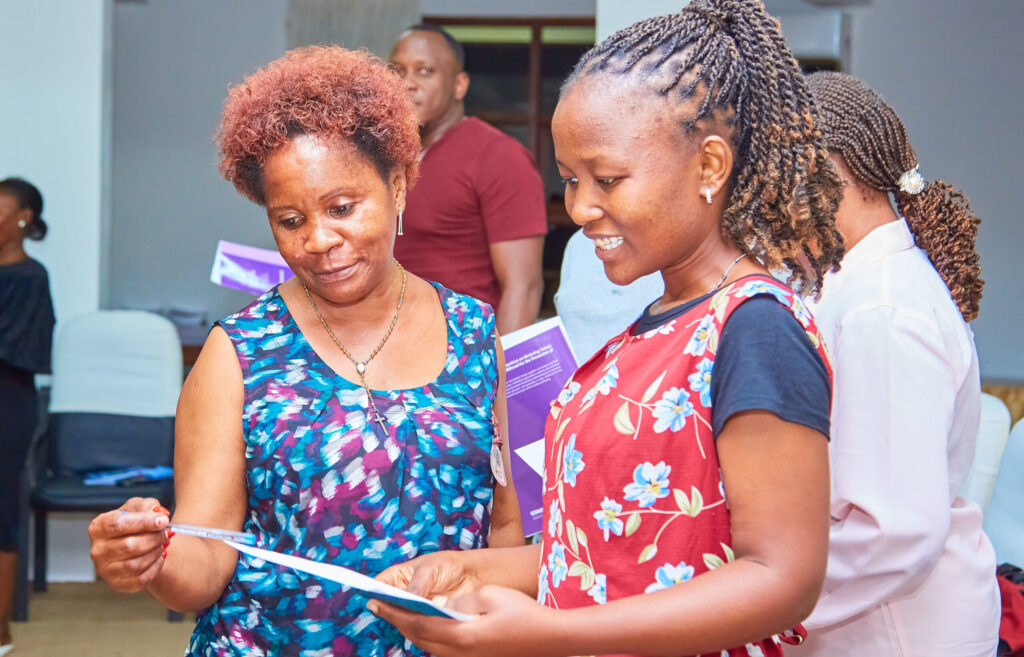
In a pioneering initiative, Arigatou International — Geneva, the Global Network of Religions for Children (GNRC) Tanzania, and the Global Religions for Children Foundation joined forces to carry out a training workshop in Tanzania. Launched during the Day of the African Child, the workshop equipped religious, community leaders, and social workers with skills to nurture the spiritual development of children in their formative years. The event is based on the innovative Toolkit, “Nurturing the Spiritual Development of Children in the Early Years,” developed by the Consortium on Nurturing Values and Spirituality in Early Childhood for the Prevention of Violence.
The workshop, held from 16-20 June 2024, brought together 16 participants from various faith communities, including Roman Catholics, Mennonites, the Shia Muslim community, and the Bahá’í community. Over the course of three days, participants reflected on the critical role of spiritual development in preventing violence in early childhood and learned how to facilitate similar workshops in their local communities for parents and caregivers.
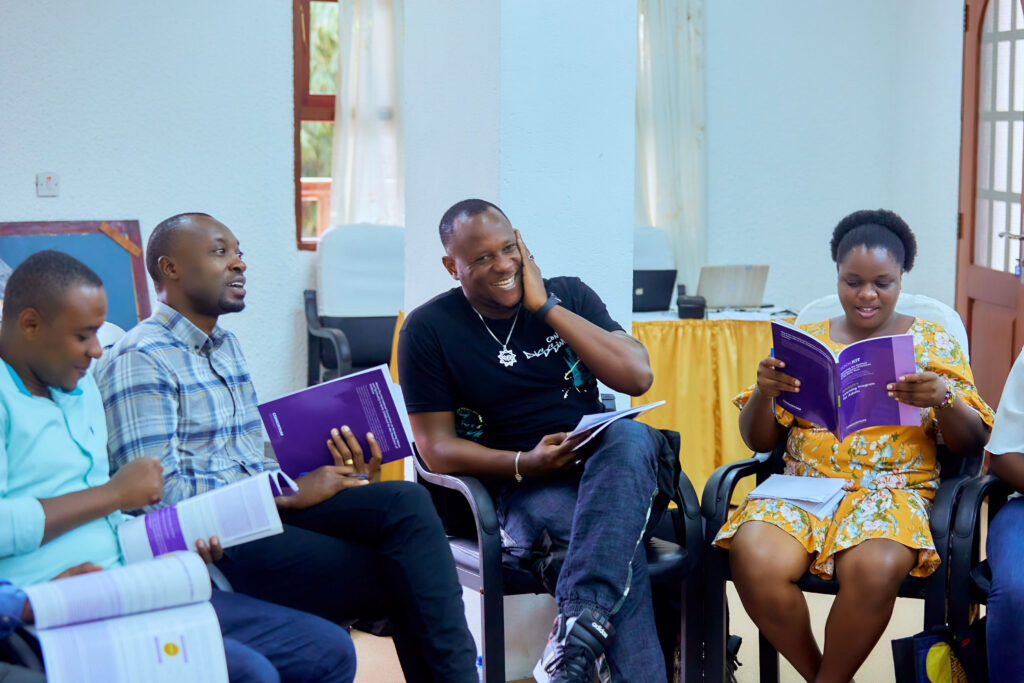
A highlight was the participation of Mr. Mathis Haule, Deputy Director of the Child Development Department from the Ministry of Community Development, Gender, Women and Special Groups in Tanzania. In his address, Mr. Haule provided an insightful overview of the challenges related to violence against children in Tanzania and emphasized the government’s ongoing collaboration with stakeholders to address this pressing issue.
Underscoring national initiatives for Early Childhood Development (ECD), Mr. Haule stated, “We are currently developing a national ECD program and guidelines for parenting. These initiatives do not currently include aspects of spiritual development despite its importance, and by participating in this workshop we look forward to understanding how we can integrate spiritual development into our national initiatives.”
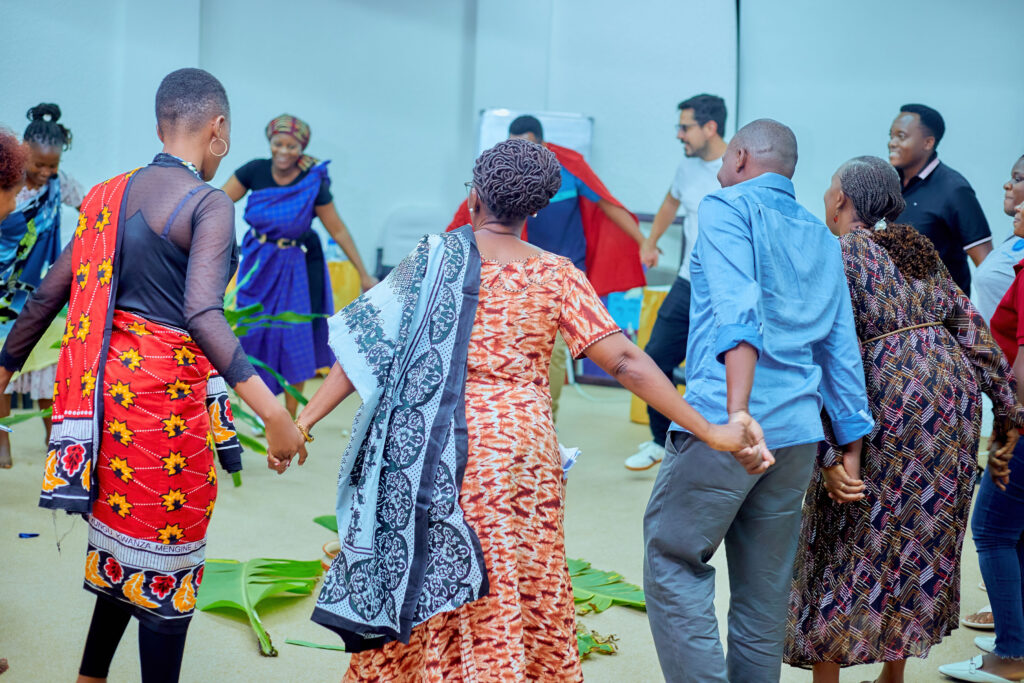
This workshop marks the first implementation of the Toolkit in Africa, positioning Tanzania as a leader in advancing spiritual development within the region. Participants include child development NGO representatives, project officers, religious leaders, and government consultants, many of whom bring substantial expertise in child development and ECD. Their main takeaways have centered on bridging the gap in integrating spiritual development into existing ECD programs and its profound link to preventing violence.
Participants reflected on the multifaceted nature of spirituality and its significance in shaping a child’s early years. Discussions focused on fostering safe environments, positive relationships, and empowering experiences that cultivate spiritual growth.
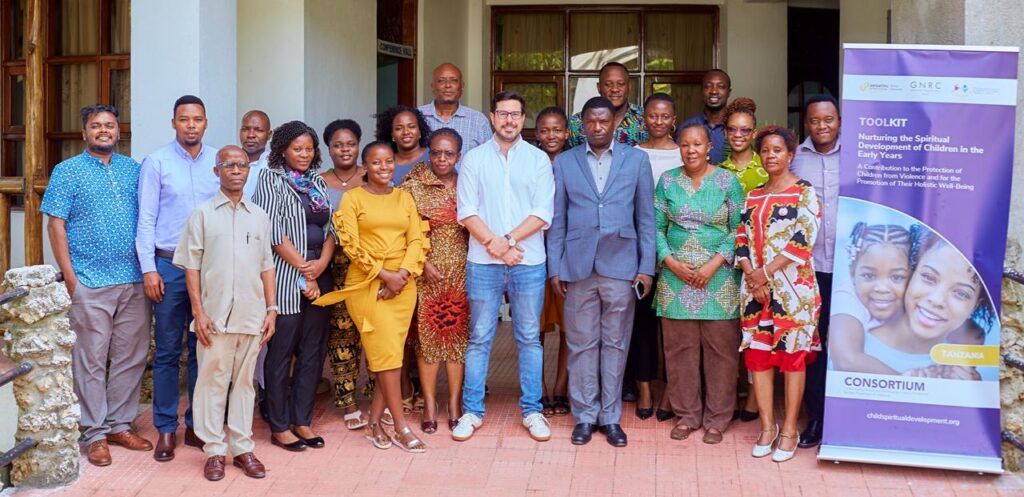
The workshop was facilitated by Mr. Suchith Abeyewickreme, Technical Lead, at Arigatou International – Geneva; Mr. Francisco Vila, Head of Programs at Arigatou International – Geneva; Ms. Joyce Mdachi, Coordinator at GNRC Tanzania; and Mr. Venance Temu, Project Officer at GNRC Tanzania. This initiative was possible thanks to the support of the Smart Peace Foundation.
As the program continues, the participants are expected to carry forward the teachings to their communities, contributing to a larger movement across Africa that prioritizes spiritual development as a cornerstone of child protection. The Shia, Bahai and Mennonites communities, as well as, the NGO Ladies Joint Forum committed to implementing the Toolkit within their existing ECD programs.
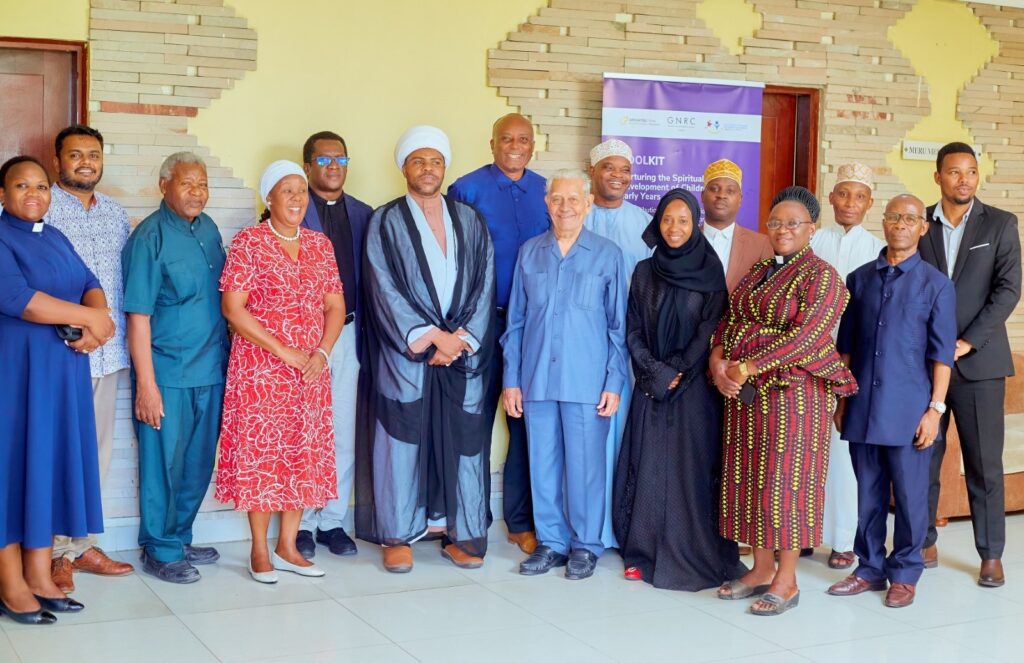
Following the workshop, a roundtable discussion took place on 21 June 2024, bringing together 11 religious leaders from diverse communities including the Anglican Church, Moravian Church, Shia Community, National Muslim Council of Tanzania (BAKWATA), Lutheran Church, Bahá’í Community, Hindu Community, and the Inter-religious Council for Peace Tanzania.
The roundtable aimed to introduce the Consortium and the Toolkit, explore potential synergies and collaborations, and discuss strategies for integrating the Toolkit into existing Early Childhood Programs. The discussion also focused on advocating for the inclusion of Spiritual Development in Early Childhood Development Programs at both national and regional levels.
We extend our gratitude to our partners for their steadfast commitment and to the participants for their dedication. This initiative was made possible with the generous support of the Smart Peace Foundation.
The post Groundbreaking Training Workshop Launched in Tanzania to Nurture Spiritual Development in Early Childhood appeared first on Ethics Education for Children.
15/05/2024 - Convening of Champions: Nations Commit to Ethics Education

Held on 23-25 April 2024, the ‘Convening of Champions’ meeting marked a significant milestone in the Ethics Education Fellowship collaboration. The gathering was attended by 70 participants from 17 countries, including senior representatives from Ministries of Education, UNESCO offices, partner organizations, as well as religious leaders. The event served as a bustling hub for discussing the importance of prioritizing and investing in Ethics Education.
The event featured two days of technical discussions and strategic planning, followed by a one-day high-level segment. Held in Abu Dhabi, UAE, the meeting was co-hosted by the Muslim Council of Elders and the Higher Committee of Human Fraternity, together with Arigatou International, Guerrand-Hermès Foundation for Peace, KAICIID International Dialogue Centre, and UNESCO.
The meeting explored the Ethics Education Fellowship program’s transformative impact on children, teachers and the community. Launched in 2022 with the engagement of the Ministries of Education of Bangladesh, Indonesia, Kenya, Mauritius, Nepal and Seychelles, the program sought to contribute to global citizenship and to build inclusive and peaceful societies.
Throughout the three-day event, participants reflected on the critical role Ethics Education plays in the current context and how it can address the needs of children to support their holistic well-being. “An essential step in the road to peace is to ensure that every child grows up with full access to their innate capacity for spiritual development. This is why the implementation of interfaith ethics education both in schools and in other educational settings is so vital,” stated Mr. Hironari Miyamoto, in representation of Rev. Keishi Miyamoto, President of Arigatou International.
In the same vein, H.E. Dr. Ahmad Belhoul Al Falasi, Minister of Education of the UAE stated, “Our approach to education must ensure that our young people develop a core set of universal principles and values that reflect the shared experience of humanity that are relevant in any society.”
Representatives from the Ministries of Education shared invaluable insights drawn from their experiences implementing the program in the participating countries, which reached 324 teachers and benefited 8,034 children and youth. They showcased the excellent results of the program, discussed challenges and opportunities, explored its scalability and sustainability at the national level and looked into potential collaborations with diverse partners.
H.E. Dr. Justin Davis Valentin, Seychelles Minister of Education, remarked, “We took the Fellowship Program very seriously and it fits very well in our strategy of promoting value-based education. We are already experiencing great outcomes as a result of implementing ethics education within our school curricula.”
One of the event’s highlights was amplifying the voices of children and young people. Through video messages, children shared their learnings after participating in the program. Alice, a young student from Kenya explained how the program helped children in her class coexist more peacefully by appreciating the differences between ethnic groups. Similarly, Tia, a student from Seychelles said, “Ethics education is important for me because it showed me to learn more about me and others;” “Ethics Education also taught us to avoid racism, treat everyone equally and respect everyone’s precious opinion” added Warisa, from Bangladesh. Bernadeth from Indonesia stated that the activities were interesting and fun. “I learned how to make quick and wise decisions. I think it is important for my daily life,” she declared.
Calling for the Ministries of Education to continue and expand the program, Kumakshi, a student from Mauritius said, “I hope that ethics education will be introduced in all schools in Mauritius.” “All students should have the opportunity to get involved in ethics education programs,” reflected Krishna, from Nepal.
Country representatives made commitments to increase the investment and focus on Ethics Education in formal and non-formal education systems. They also stated their plans to integrate and mainstream Ethics Education to promote intercultural and interreligious learning and dialogue in the education curriculum, policies and programming across the education system. Participating countries’ plans include strengthening the capacity of formal education institutions and educators on Ethics Education through teacher training programs for pre- and in-service teachers.
“We have seen in these days concrete evidence of how ethics education contributes to foster the principles of human fraternity and interconnectedness, peaceful coexistence and solidarity, nurturing positive relationships and empowering learners to transform societies,” stated Dr. Khalid Al Ghaith, Secretary General of the Higher Committee of Human Fraternity, on behalf of the Secretary General of the Muslim Council of Elders, Judge Abdelsalam, as the event came to an end.
A full report of the event, including its main results, next steps, and the commitments from each country will be released soon. The recording of the high-level panel is available in this link.
We thank the ministries of education, and partners of the Ethics Education Fellowship, including the fellows, teachers and children, as well as the high-level panel speakers and attendants, for walking with us on this transformative journey towards integrating Ethics Education into children’s educational pathway.
The post Convening of Champions: Nations Commit to Ethics Education appeared first on Ethics Education for Children.
05/09/2023 - Training of Trainers Workshop in Mexico: Nurturing the Spiritual Development of Children
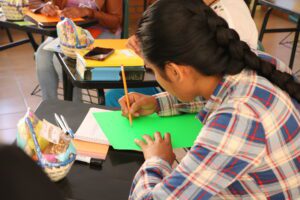
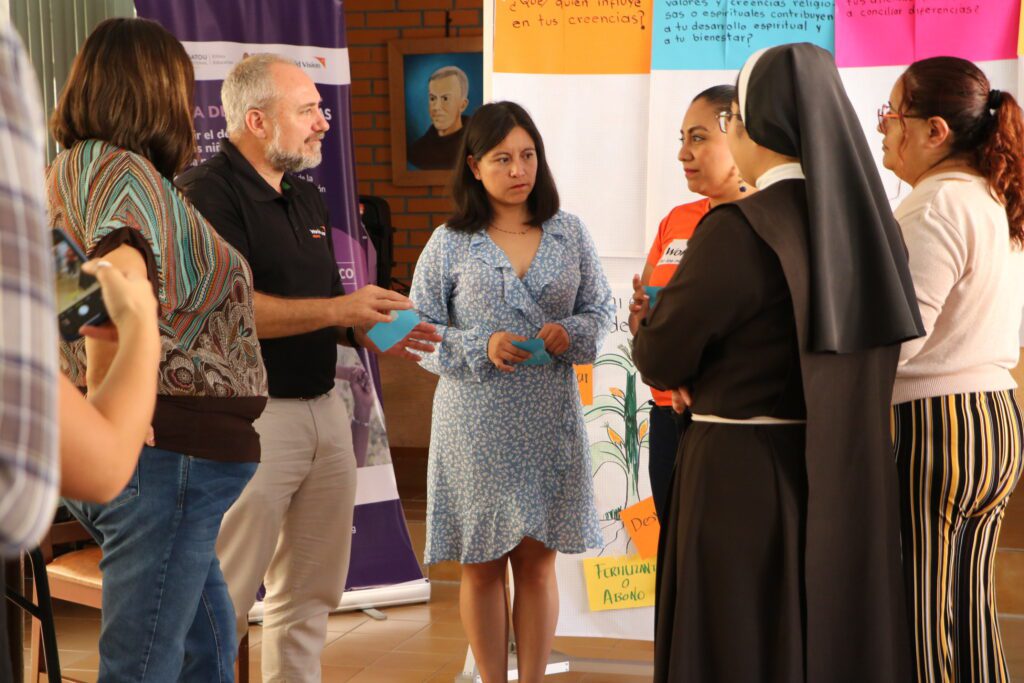
A Training of Trainers workshop on the Toolkit: Nurturing the Spiritual Development of Children in the Early Years was held in Mexico City from 12 to 16 June 2023. This was the first of its kind in Mexico and the second in a series of four workshops, following on from the successful workshop held the previous month in Curitiba, Brazil.
The workshop aimed at empowering trainers with the knowledge, skills, and tools required to design, plan, execute, monitor, and evaluate training programs for facilitators who will work directly with parents, caregivers, and educators.
The workshop gathered 20 participants, including Catholic Sisters, psychologists, educators and staff members from the organizing partners that have committed to implementing the Toolkit into their existing programs in the field. The workshop was hosted by the Franciscan Sisters, and co-organized by Arigatou International and World Vision – Mexico. The Global Center for the Development of the Whole Child at the University of Notre Dame, which are leading the Monitoring, Evaluation and Learning (MEL) framework, also supported the workshop and guided the MEL processes. The workshop was also observed by Porticus North America, who funded the first two years of implementation in Mexico as well as the global MEL framework development.
During the workshop, participants reflected on the importance of spiritual development in the model of holistic development in early childhood, our own understandings of spirituality, and the criticality of nurturing one’s own spirituality in order to nurture children to develop to their full capacities spiritually.
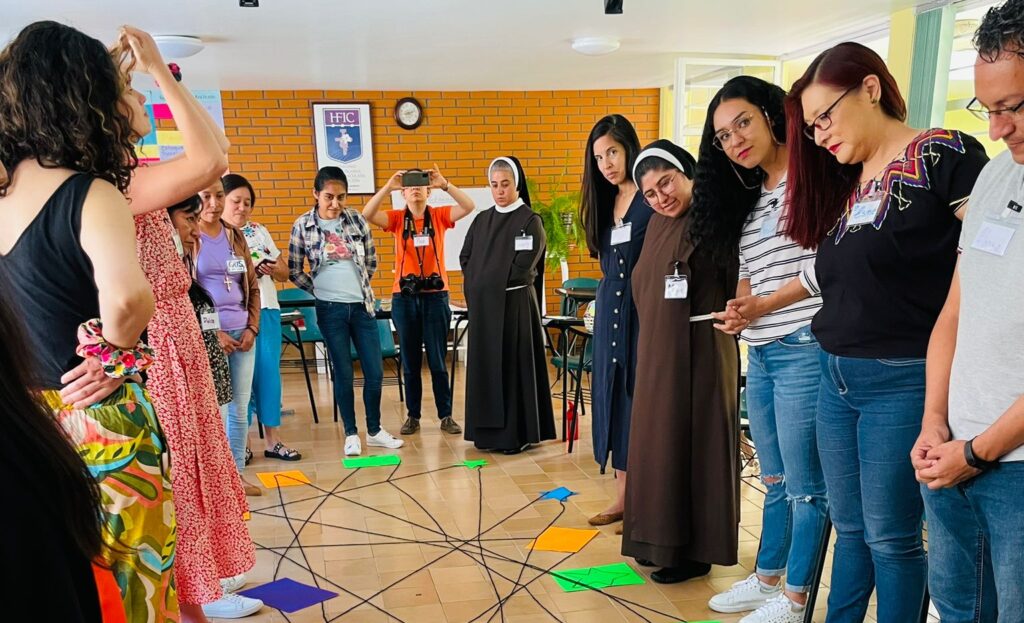
In the kick-off, Mr. José Antonio Ruiz, National Officer for Child Protection from UNICEF México, joined the session, to present important statistics about the challenges children face regarding violence in the country. It was a thought-provoking moment that reminded the attendants of the significance of protecting children, especially in the early years, and the importance of such workshops.
Throughout the 5 days, participants delved deeply into the connection between nurturing the spiritual development of children and their protection from violence. Participants explored how the brain develops and the impact of violence on its development, as well as exploring the critical importance of three key conditions that support children’s holistic well-being. These conditions, empowering experiences, positive relationships and safe, respectful and violence-free environments, were examined through different activities and group work.
Participants also considered how they would cascade their learnings to other adults in their communities and organizations, who would later be trained as facilitators, and think about conducting this learning program to empower parents, caregivers, and educators to nurture the spiritual development of children in the early years. The training highlighted the need to tailor the sessions of the Toolkit to diverse cultural, religious and spiritual contexts, and how to address diverse types of violence affecting children and families in the communities in which they work.
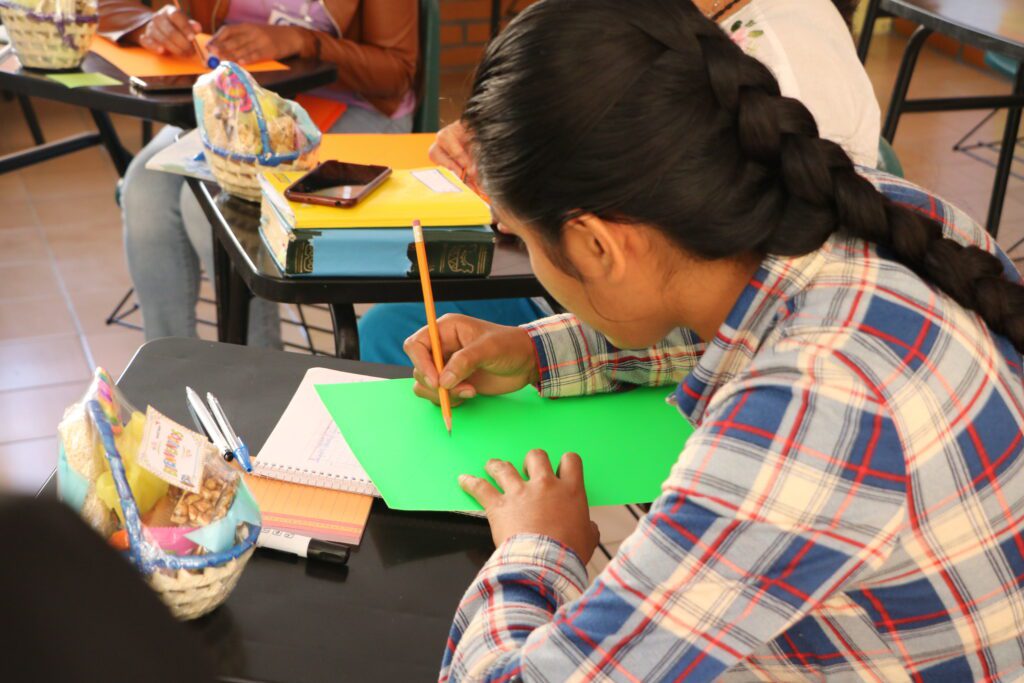
At the end of the week, participants shared that the workshop provided them with both professional skills and personal spiritual growth, especially with the focus on oneself. “It is never too late to think about yourself and take some time to meditate, find yourself and give priority to oneself as a person,” said one of the participants. Through this connection with oneself, participants also shared that it reinvigorated their personal motivation and passion for working with children and families as it enabled them to understand spirituality as the interconnectedness with others.
Also, participants shared how they enjoyed the methodology and learning process of the workshop as it provided them with deep personal growth through practical activities that connected the theory to their realities. One participant said that, “It exceeded my expectations and was a radical change in my personal and professional life.”
The Franciscan Sisters and World Vision – Mexico will implement the Toolkit systematically for the next year and a half within their existing programs, expecting to reach 4,700 parents and caregivers through on-site training in four regions of Mexico.
We thank our partners for working hand in hand with us on this one-of-a-kind project and extend heartfelt gratitude to all participants, who are now pioneer trainers on the spiritual development of children, for paving the way to make a real difference in the lives of families and children across Mexico.
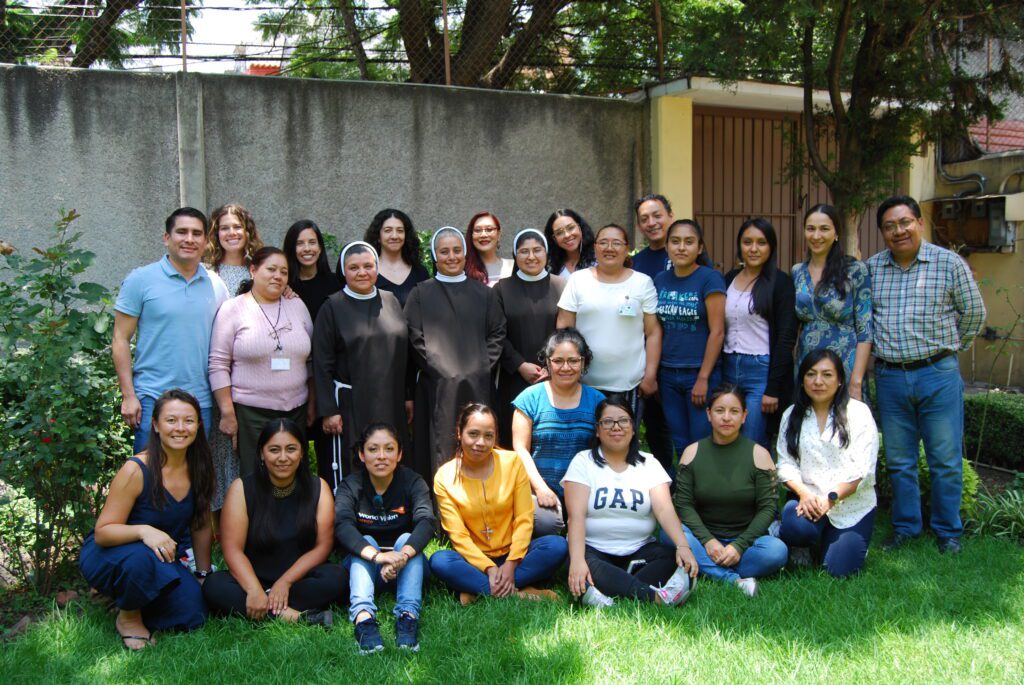
The post Training of Trainers Workshop in Mexico: Nurturing the Spiritual Development of Children appeared first on Ethics Education for Children.
05/09/2023 - The First-Ever Training of Trainers Workshop on the Toolkit Was Held in Brazil
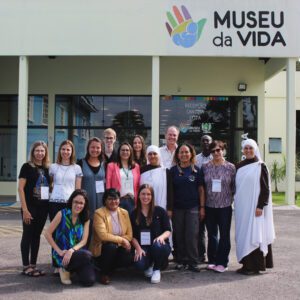
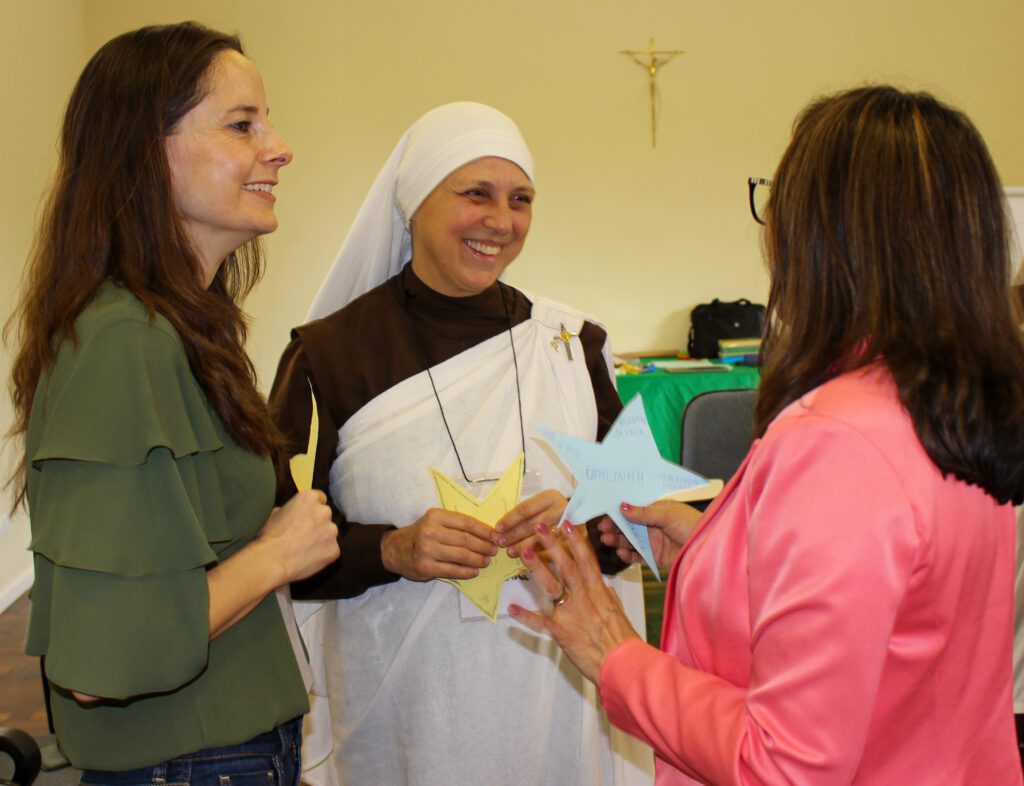
Arigatou International – Geneva in collaboration with Pastoral da Criança has successfully conducted the first-ever training of trainers workshop on the Toolkit: Nurturing the Spiritual Development of Children in the Early Years. The workshop took place at the Museu da Vida in Curitiba, Brazil from the 8th to the 12th of May, 2023.
The Toolkit was developed by the Consortium on Nurturing Values and Spirituality in Early Childhood for the Prevention of Violence and was launched in Rome, in 2022. The Toolkit aims to help equip faith actors, parents, caregivers, educators and community members to actively engage in the promotion of children’s well-being by nurturing spiritual development in the early years and to address violence in early childhood. This workshop was designed to empower participants with the essential tools and knowledge to cascade these capacities within their organizations.
The group of participants included ten members of Pastoral da Criança, and four members of Fraternity – International Humanitarian Federation (FIHF), who work in various humanitarian settings across Brazil. Among the participants were Catholic Sisters, community leaders and parish coordinators, as well as technical staff from the organizations.
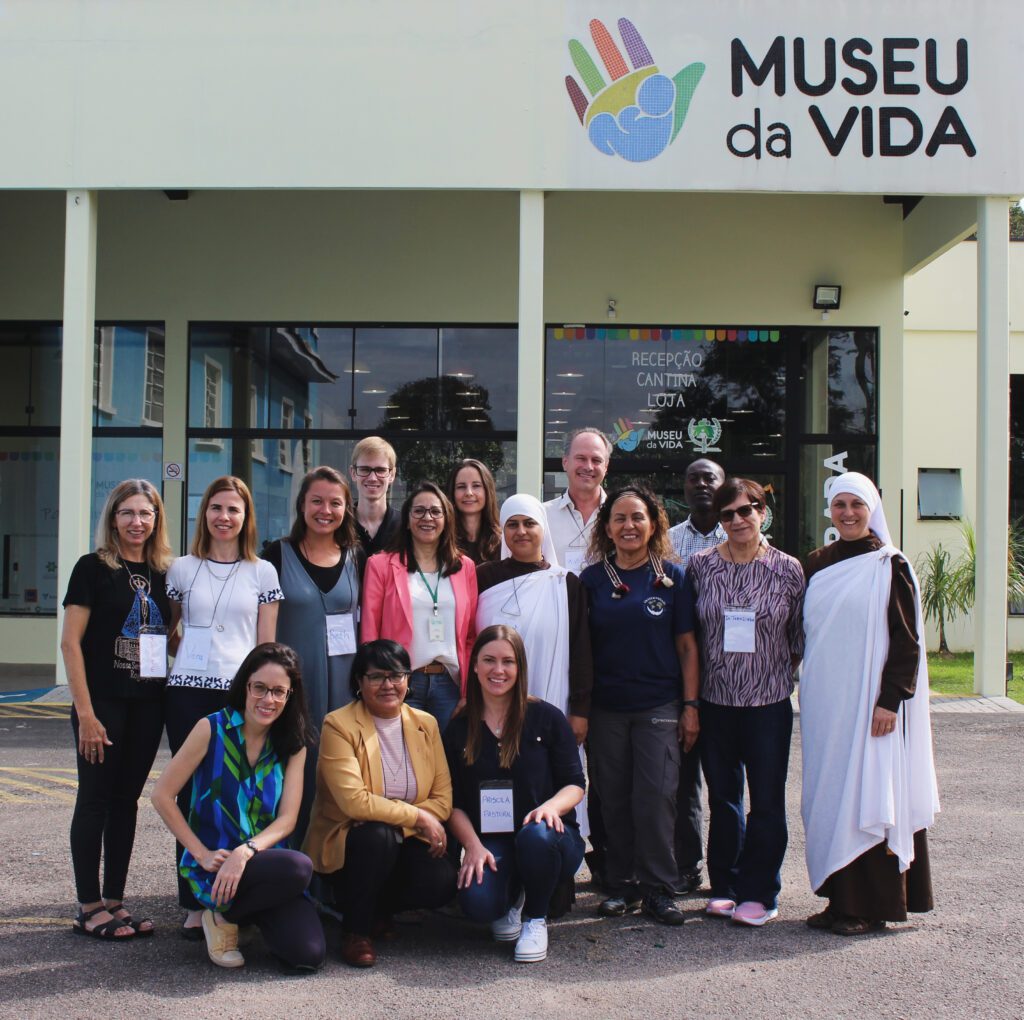
This was a very unique workshop, not only because of its inaugural status but also for the innovative way in which was rolled out using digital tools. Through the use of their app, Pastoral da Criança can reach families and communities in remote areas. Their app, available online and offline, provides material for families to download and access as well as a space for facilitators and trainers to upload reporting, updates and seek help from the technical team of Pastoral da Criança.
Throughout the sessions, participants were able to connect the content of the Toolkit with the contexts in which they work and gain practical skills to directly implement it with beneficiaries such as parents, caregivers, and educators. Moreover, they will be able to train other adults to become facilitators of the Toolkit.
During the discussion on early childhood and children’s holistic development, participants were prompted to reflect on their own childhood experiences. This led to a sense of gratitude towards the adults who played a significant role in their upbringing. One participant shared, “My parents were the foundation for everything. Despite being illiterate, my mother placed great importance on our education, and I feel deeply grateful for this.”
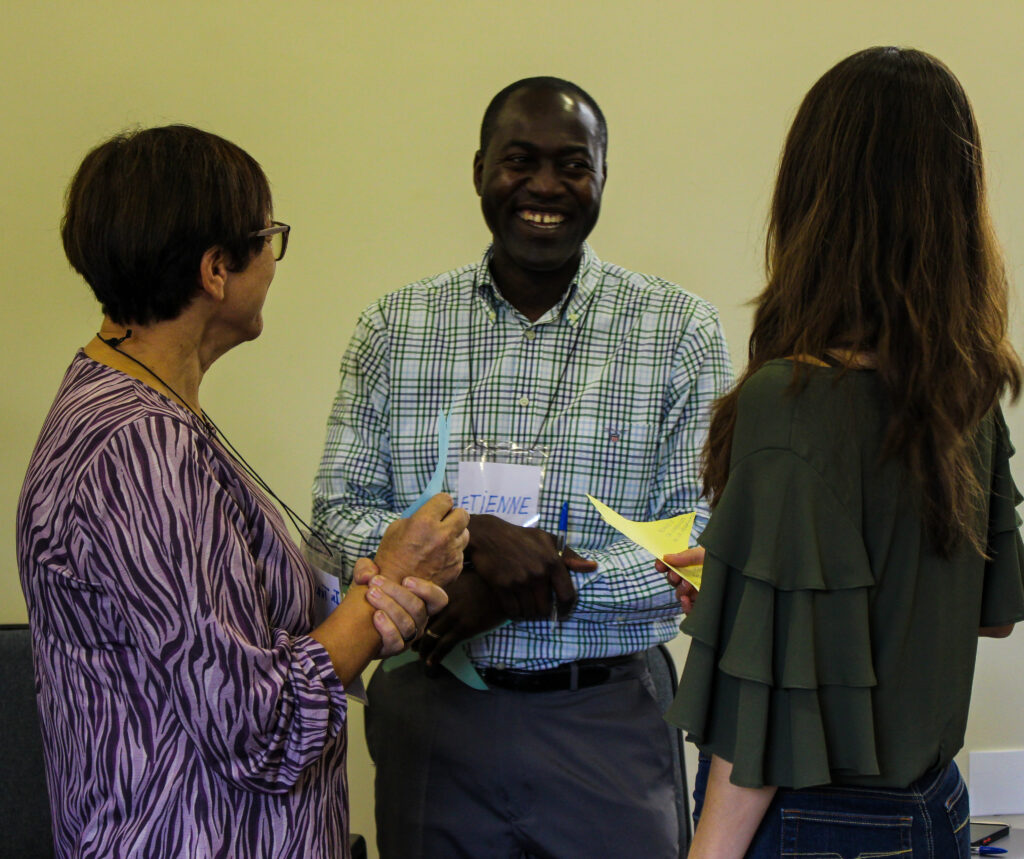
Participants explored the connection between their spirituality and nature. One participant shared her strong bond with Mother Earth and her indigenous roots, and how this is linked to her understanding of spirituality. After reflecting on how we are all interconnected, participants expressed a great sense of gratitude toward others.
The session on the importance of creating empowering experiences for children led participants to reflect on the different ways they can create opportunities for children. “We must allow them to become protagonists,” a participant highlighted.
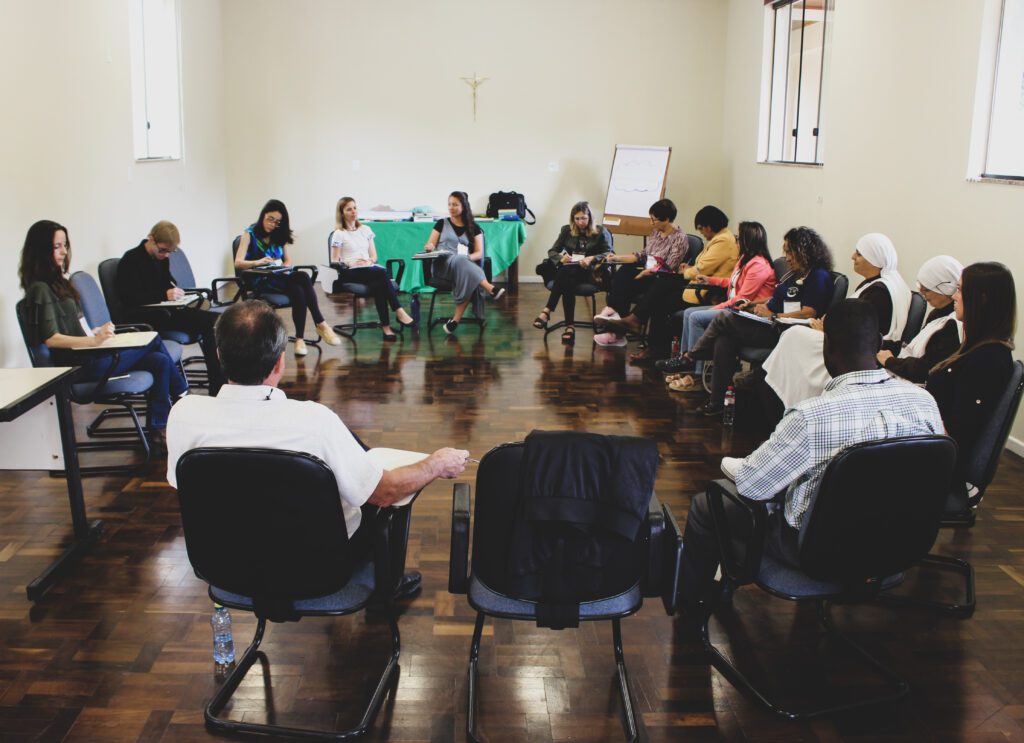
Guided by the expertise of Arigatou International, in conjunction with Ms. Carol Dalabona, National Coordinator, and Ms. Priscila do Rocio Costa, both from Pastoral da Criança, the sessions unfolded with great interest and enthusiasm from the participants.
The Consortium on Nurturing Values and Spirituality in Early Childhood for the Prevention of Violence is comprised of 22 partners from faith-based and civil society organizations, religious and spiritual communities, academia, multilateral organizations and individual experts.
The Toolkit was developed as part of a four-year process and collaboration as a contribution to the protection of children from violence and for the promotion of their holistic well-being.
We’re delighted to witness the Toolkit coming to life through this hands-on training, and we look forward to seeing the positive influence it will bring to communities throughout Brazil.
The post The First-Ever Training of Trainers Workshop on the Toolkit Was Held in Brazil appeared first on Ethics Education for Children.
03/07/2023 - Advancing Inclusive and Peaceful Societies: The Ethics Education Fellowship is Making Strides in Africa and Asia
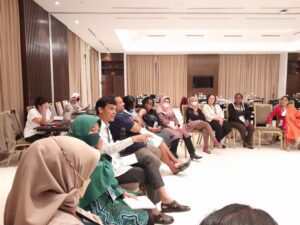
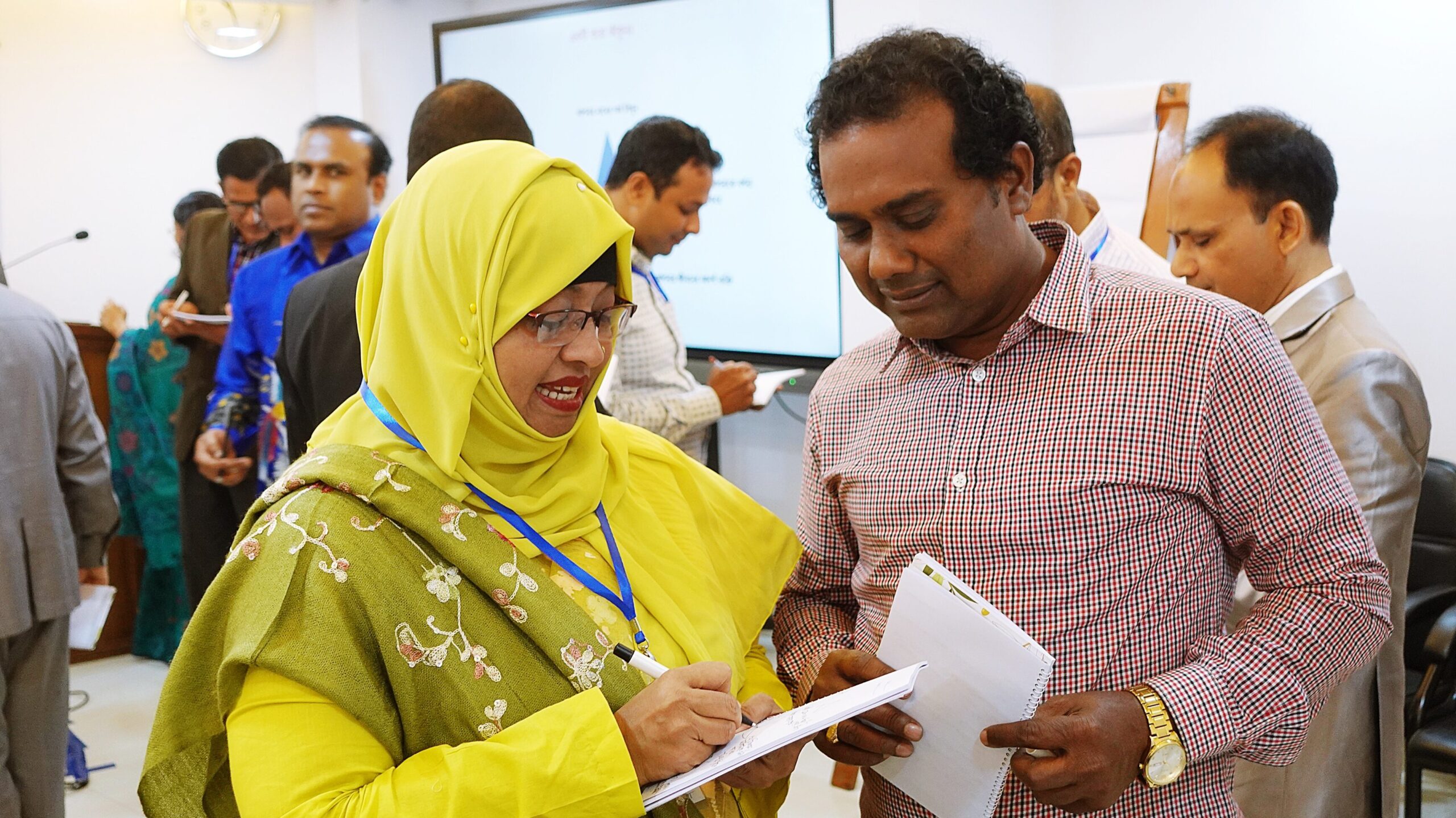
The Ethics Education Fellowship program unfolded simultaneously across six countries, making significant strides to strengthen the sustainable delivery of ethics education programs for children. Through the program, 323 teachers have been trained, paving the way to impact 4,430 children in Bangladesh, Indonesia, Kenya, Mauritius, Nepal, and Seychelles in its first year.
This groundbreaking initiative brings together six ministries of education and UNESCO National Commissions, which have worked hand in hand to integrate ethics education into their national programs. The ministries have made institutional commitments to pilot ethics education programs in formal education settings, to contribute to their national educational goals and ultimately strengthen the social cohesion to build more peaceful and inclusive societies.
“Ethics education is at the center of our planning of transforming education. It is much more important to have ethics at the center of given education rather than to have a good school infrastructure, teacher training, books and modern technologies by which we are providing it,” stated Dr. Dipu Moni, Minister of Education of Bangladesh.
This collaborative effort is made possible through a partnership between Arigatou International, the Guerrand-Hermès Foundation for Peace, the KAICIID International Dialogue Centre, the Muslim Council of Elders, the UNESCO Regional Office for Eastern Africa, and the UNESCO New Delhi Cluster Office, in collaboration with the National Commissions for UNESCO of the participating countries.

A Transformative Pedagogy Approach
Education plays a critical role in building more inclusive, peaceful societies. Ethics education, in particular, can equip teachers to provide educational spaces that nurture in learners the kind of ethical values and ethical reflection practices that can equip them to flourish and thrive.
“When we talk of ethics education we are not talking about the philosophical study of ethics, we are talking about creating spaces for children. We want to go on a journey with you to help empower our children,” explained Mr. Suchith Abeyewickreme, Program Officer, Arigatou International – Geneva.
Ethics Education equips children and youth with life skills by employing transformative pedagogical approaches that place them at the center of learning, enhance their capacity to think critically, make ethical decisions, and learn to work collaboratively with others to make positive contributions to their communities.
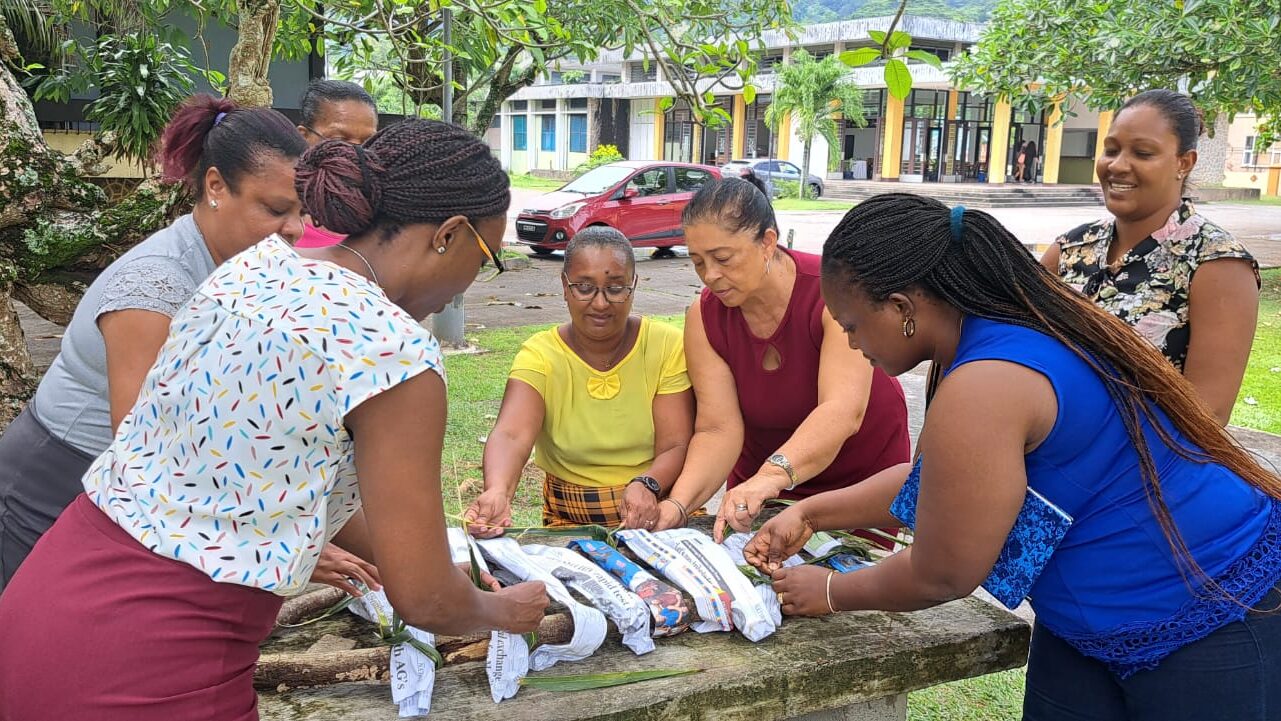
First Train the Trainers Workshop
The Ethics Education Fellowship kicked off in Indonesia on 3-9 October 2022 with a Train the Trainers Workshop for the 30 fellows, which includes ministry officers, school principals, teachers, professors, lecturers, teacher trainers, and curriculum developers from the six participant countries. At the workshop, the fellows were trained in designing and delivering training workshops for teachers.
“The fellows are ethics education champions in their country. They will serve to strengthen the country’s capacity for ethics education through the capacity development of teachers and teacher education as well as school-based initiatives,” explained Ms. Mary Kangethe, Director of the Education Programme at the Kenya National Commission for UNESCO.
During this immersive workshop, the fellows sharpened their knowledge, skills, and competencies in ethics education and transformative pedagogies that support dialogue, reflection and action. They are now spearheading the program at the national level, and working with other government education partners to ensure that ethics education can be integrated into training, national programming and policies.
Mike Waltner, Senior Programme Manager for the Asia Region Programme at the International Dialogue Centre – KAICIID described this initiative as transformative. “It’s more than integrating ethics and dialogue into education systems; it’s about catalyzing societal change. Teachers are bringing the lessons from the fellowship into classrooms and beyond to empower children and youth to be agents of that change. At KAICIID, we believe in the power of dialogue to foster understanding and peace. This project equips young learners to be leaders who can work together with their peers from different religions and cultures to create a better world,” he said.

Training Workshops for Teachers
Between January and May 2023, the fellows conducted national training workshops for teachers, with the technical support of international trainers from Arigatou International and KAICIID. In total, 323 teachers were trained in the implementation of ethics education programs for children.
“If I hadn’t attended this workshop on ethics education, I wouldn’t have noticed several things that I’m aware of now. This workshop has had a direct impact on me. I now find myself automatically thinking, reflecting, and seeing things differently,” shared one of the participants from Seychelles.
A participant from Nepal shared how the workshop had helped him become aware of his own unconscious biases. He understood the importance of treating all children equally, regardless of their differences, and felt empowered to ensure fairness and inclusivity for all students in the classroom.
These trained teachers are set to implement ethics education programs in their schools according to their country’s implementation plans. In its inaugural year, the program aims to reach 4,430 children.
The group of partners developed a comprehensive Training Guide to support the national teacher training workshops, offering step-by-step guidelines to support fellows to conduct the workshops, along with a framework and tools for monitoring, evaluation and learning. A Teacher Activity Booklet was also developed to support the designing and delivering of ethics education programs in the classroom.
The guides are based on Arigatou’s Ethics Education Approach and the expertise of KAICIID on interreligious and intercultural dialogue as central components of a transformative pedagogy that contribute to the promotion of global citizenship. They also include a human-centered education approach, promoted by the Guerrand-Hermes Foundation for Peace, that places the learner at the center of the education experience.
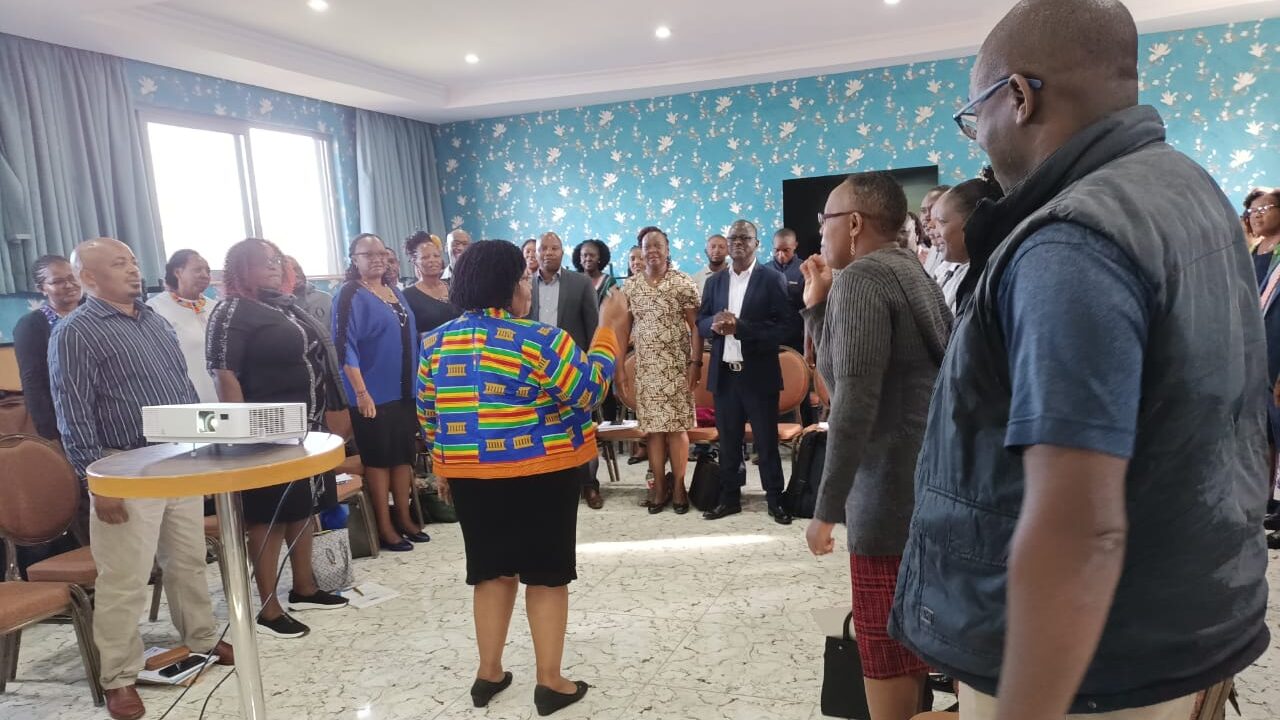
A Global Community of Practice
This initiative not only aims to establish a network of formal education institutions but also provides a platform for sharing knowledge and building capacity. In this light, a Global Community of Practice was established, fostering a network of Fellows. Through monthly webinars, participants deepen their knowledge on specific topics, receive support in preparing national workshops, share experiences, and strengthen connections.
Reflecting on the benefits of belonging to the Global Community of Practice, Ms. Nita Isaeni, a fellow from Indonesia said: “Being part of this community means a lot to me. It’s a place where I can learn and improve, not just in terms of knowledge but also in how I perceive things and connect with my inner self. Moreover, I get the opportunity to build connections and social networks with people from all over the world, which is very valuable to me.” Ms. Isaeni is the Coordinator of Learning Transformation, at the Directorate of Teachers for Primary School, MoECRT.
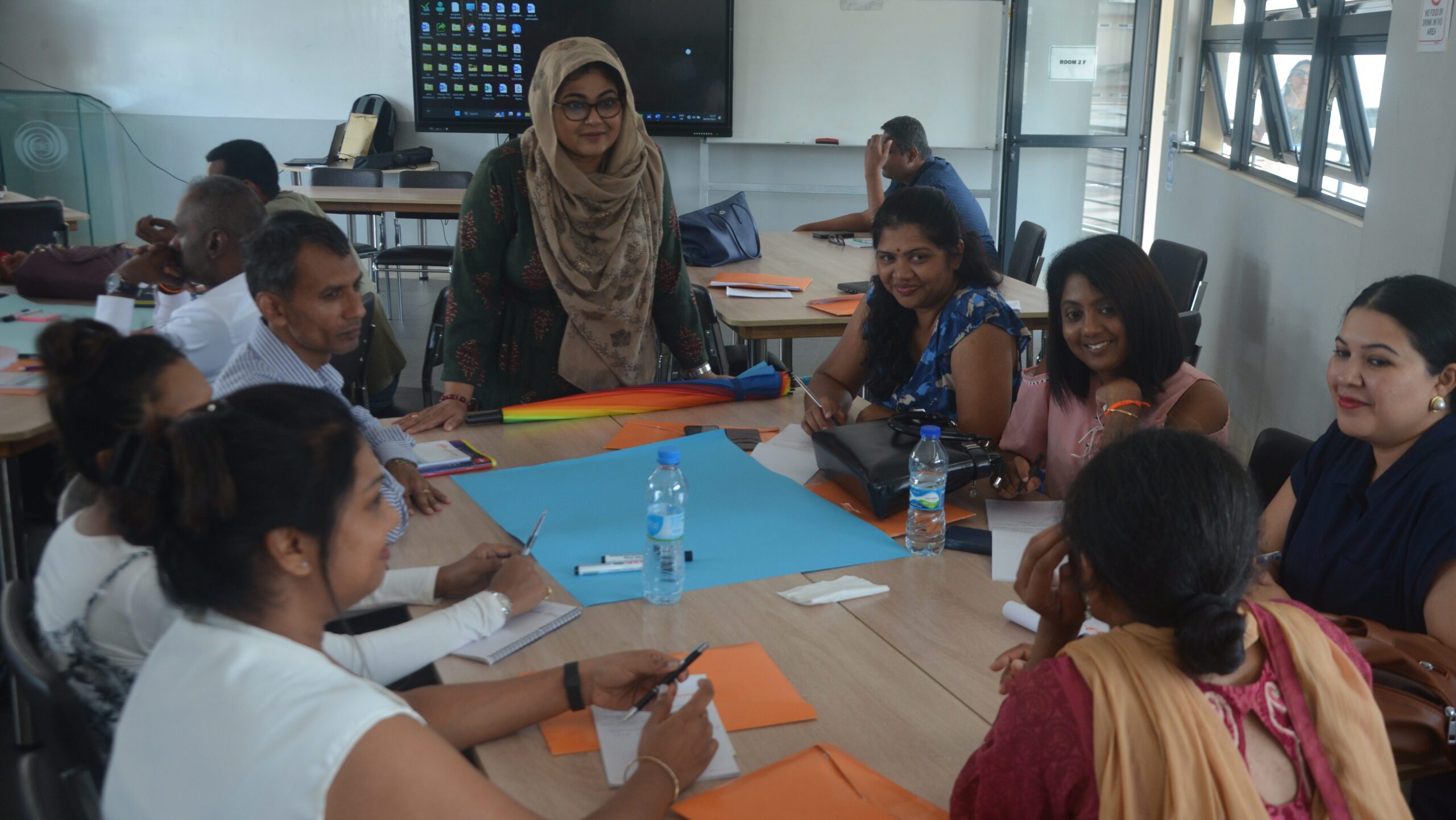
Implementation with children in schools
In March 2023, the implementation with children began, yielding encouraging results. Teachers have witnessed positive outcomes, with notable improvements in student engagement and participation. Integration of peace and ethics clubs in schools has been a successful initiative, fostering a sense of community. Ms. Norah Babu, a teacher from Thogoto Model Primary School in Kenya, shared her perspective: “Through participatory and collaborative learning, students who were once hesitant to ask questions now feel comfortable seeking assistance from their peers. I’ve also learned the importance of creating a safe learning environment, resulting in my students eagerly anticipating my lessons.”
The Ethics Education Fellowship responds to the critical need to prioritize and invest in ethics education within formal education systems. By building the capacity of teachers to foster positive relationships and empower learners, the program contributes to the creation of more inclusive, respectful, and resilient societies. Equipped to respond to ethical challenges, students become active citizens and agents of positive change.
The Ethics Education Fellowship program serves as an inspiring example of the power of collaboration, dedication, and a shared commitment toward children, their education, and the future of our societies.
This news article has been developed jointly by the partners of the Ethics Education Fellowship.
The post Advancing Inclusive and Peaceful Societies: The Ethics Education Fellowship is Making Strides in Africa and Asia appeared first on Ethics Education for Children.
12/06/2023 - Empowering Educators in Seychelles: National Teacher Training Workshop by the Ethics Education Fellowship
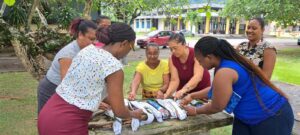
The Ethics Education Fellowship made its debut in Seychelles with a national Teacher Training Workshop, held from 20 to 24 February 2023, which brought together 20 primary and secondary school teachers. The program, endorsed by the President of Seychelles and approved by the Cabinet of Ministers, aims to extend its reach to over 450 children across 15 schools.

The Ethics Education Fellowship Program
The Fellowship Program is a collaborative initiative involving the ministries of education from Bangladesh, Indonesia, Kenya, Mauritius, Nepal, and Seychelles. The program seeks to enhance the sustainable implementation of ethics education programs in formal education settings, promoting intercultural and interreligious learning and dialogue, as a contribution to global citizenship, and building more inclusive and peaceful societies.
By building the capacities of educators in each participating country, the program equips them with the skills to design and facilitate transformative learning journeys for children. This approach places learners at the center of the educational experience, fostering critical thinking, ethical decision-making, and collaborative problem-solving to empower them to make positive contributions to their communities.
Ms. Diana Monthy, a Lecturer at the Seychelles Institute of Teacher Education and a Fellow of the program, highlighted the importance of ethics education for the country. Referring to the national Constitution’s preamble, she emphasized that the program presents a timely opportunity to assess the national commitment and progress in creating “a just, fraternal and humane society in a spirit of friendship and co-operation with all peoples of the world… and where Seychelles serve as an example of a harmonious multi-racial society.”
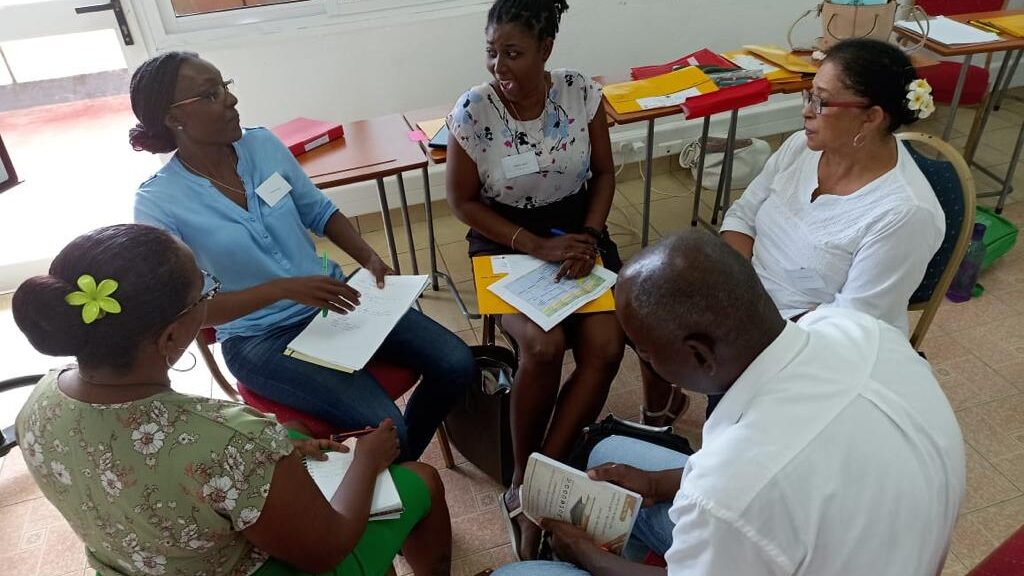
The Training Workshop for Teachers
Ms. Merna Eulentin, the Principal Secretary for Education of Seychelles, took the stage at the opening ceremony of the training workshop for teachers, setting the tone for the upcoming days. In her opening remarks, Ms. Eulentin emphasized the Government of Seychelles’ commitment to ethics education and its importance as a means to strengthen educational programs: “Ethics education is the focal point at this critical untimely topic, it is a means to strengthen education programs that foster ethical values in an inter-cultural learning context,” she said. She also highlighted how this initiative aligns with Sustainable Development Goal 4.7, promoting a culture of peace, global citizenship, non-violence, and appreciation of cultural diversity.
The event was attended by the Executive Director of the Office of the Minister of Education, members of the National Assembly, the Dean of the University of Seychelles, as well as students and teachers.
Facilitator Mr. Suchith Abeyewickreme from Arigatou International delivered a keynote address, emphasizing the necessity of ethics education in a world that is increasingly diverse and interconnected. Mr. Abeyewickreme highlighted the need to acknowledge and engage with the diversity within classrooms and among teachers, making it an essential aspect of education.

Hosted at the University of Seychelles, the workshop was led by the national team of fellows with support from Mr. Abeyewickreme. The participants consisted of school teachers specializing in Personal Social Education and Catholic Religious Education.
Throughout the five-day workshop, participants familiarized themselves with the Ethics Education framework presented in the program. The framework is centered around three pillars: relationships, ethical reflections, and collective action. This approach enables learners to develop positive relationships, engage in ethical reflection and dialogue, and enhance their ability to live together harmoniously. By cultivating these skills, the program aims to empower children to effect positive change within their communities, fostering their personal growth and contributing to their societies.
Reflecting on the workshop, one participant shared, “If I hadn’t attended this workshop on ethics education, I wouldn’t have noticed several things that I’m aware of now. This workshop has had a direct impact on me. I now find myself automatically thinking, reflecting, and seeing things differently.”

Launch of the Implementation in Schools
The Fellowship Program was officially launched in Seychelles on 31 March 2023 in a formal ceremony, marking the beginning of its implementation with children from local schools.
The ceremony started with an address from Dr. Justin Valentin, Minister of Education of Seychelles, delivered by Ms. Merna Eulentin, Principal Secretary for Educational Services, followed by Mrs. Vicky Michel, Secretary General of the Seychelles National Commission for UNESCO, and Ms. Maria Lucia Uribe, Executive Director of Arigatou International – Geneva.
During the ceremony, the team of fellows presented the Ethics Education Fellowship highlighting its pillars and transformative pedagogical approach. Subsequently, certificates were awarded to the trained teachers.
Mr. Ahmed Afif, Vice President, and Mrs. Linda Ramkalawan, First Lady of the Republic of Seychelles, also attended the event. Artistic performances, including a song and a Creole dance performed by children, added to the celebratory atmosphere of the ceremony.
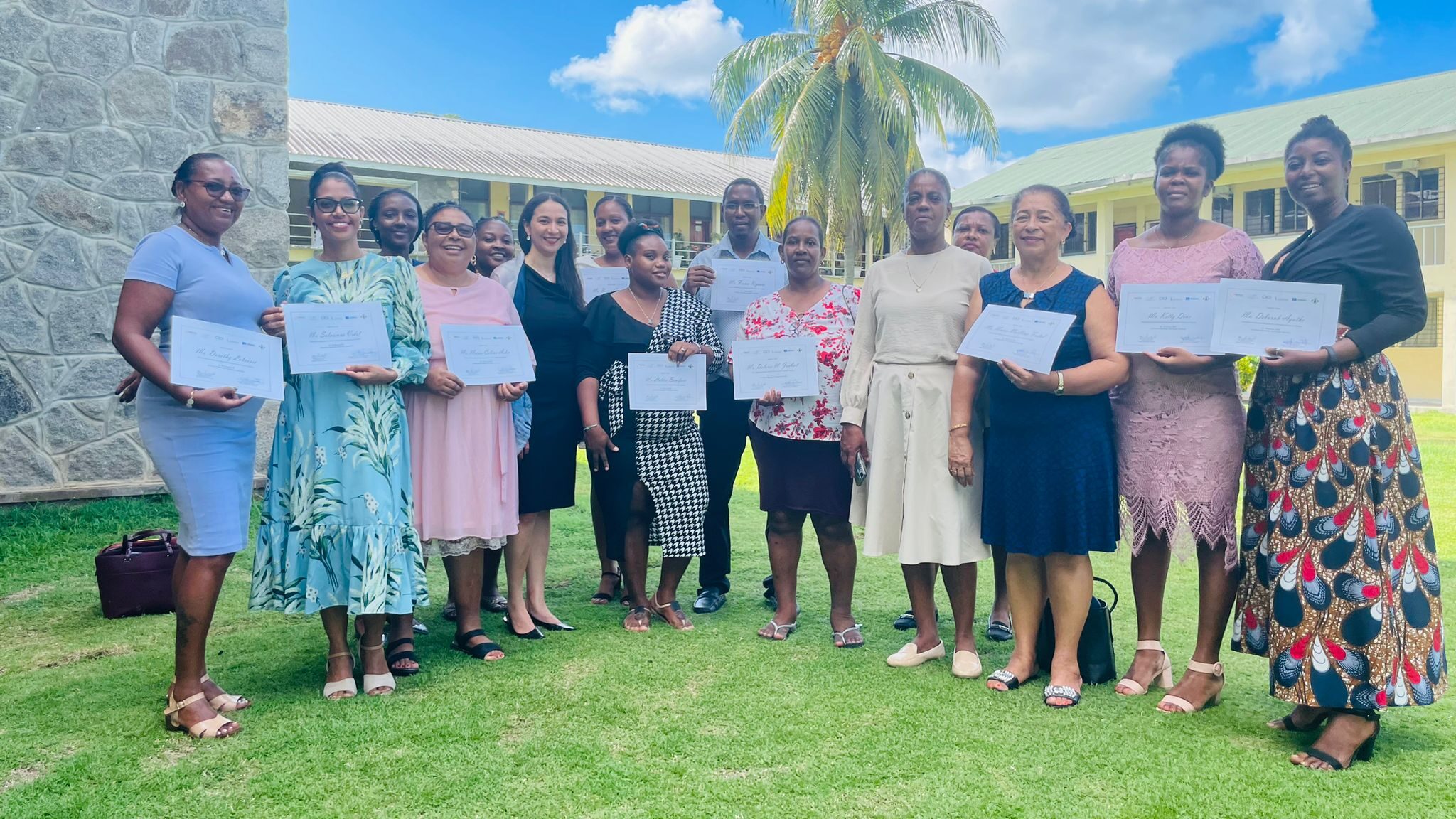
A Collaborative and Multistakeholder Journey
The Ethics Education Fellowship program is built on a fellowship model, with five representatives from each country collaborating to lead the national efforts. These representatives include educators and ministry officers who organize training workshops for teachers, monitor the successful implementation of ethics education programs for children, and advocate for the crucial role of ethics education at a national level.
Furthermore, the fellows have established a Global Community of Practice to foster collaboration, share experiences and work together for the expansion of the program.
The program is a collaboration between the ministries of education, together with Arigatou International, the Guerrand-Hermès Foundation for Peace, the KAICIID International Dialogue Centre, the Muslim Council of Elders, and UNESCO, represented by the UNESCO Regional Office for Eastern Africa and the UNESCO New Delhi Cluster Office. The process is supported by the National Commissions for UNESCO of Indonesia and Kenya.

We extend our heartfelt appreciation to the dedicated fellows: Ms. Betty-Mai Sofa, Ms. Sharon Frederic, Ms. Diana Monthy, Ms. Sandra Jeanne and Ms. Erica Derjacques-Inacio. We thank them for their invaluable contribution in conducting this teacher training workshop. We would also like to express our sincere gratitude to the partners and organizations involved, whose collaboration and support have played a pivotal role in ensuring the sustainability of this program.
The post Empowering Educators in Seychelles: National Teacher Training Workshop by the Ethics Education Fellowship appeared first on Ethics Education for Children.
09/06/2023 - The Ethics Education Fellowship Makes Strides in Bangladesh
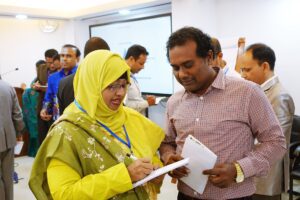

A group of 38 teachers from Bangladesh recently participated in a 5-day training workshop as part of the Ethics Education Fellowship program. The workshop aimed to equip these educators with the necessary skills to implement the program in 19 schools, benefiting approximately 1,200 children across the country.
The Ethics Education Fellowship program is a collaborative initiative between the governments of Bangladesh, Indonesia, Kenya, Mauritius, Nepal, and Seychelles. Its objective is to foster ethical values in children, promote global citizenship and build a more peaceful and inclusive society. The Directorate of Secondary and Higher Education – DSHE, under the Ministry of Education of Bangladesh, is responsible for coordinating the program in the country.
Program Launch in Bangladesh
On 22 January 2023, the Ethics Education Fellowship program was officially launched in the People’s Republic of Bangladesh. Dr. Dipu Moni, the Minister of Education of Bangladesh, participated in this occasion. In her keynote speech, Dr. Moni emphasized the crucial role of ethics education in transforming education, stating, “Ethics education is at the center of our planning. It is much more important to have ethics at the core of education than to focus solely on infrastructure, teacher training, books, and modern technologies.”
The launch ceremony also saw the participation of Mr. Mohibul Hassan Chowdhury, Deputy Minister; Mr. Suleman Khan, Secretary, Secondary and Higher Education Division, Ministry of Education; Prof. Nehal Ahmed, Director General, Directorate of Secondary and Higher Education; Ms. Susan Viz, Officer in Charge of UNESCO Bangladesh, representatives from partner organizations, as well as teachers and children.
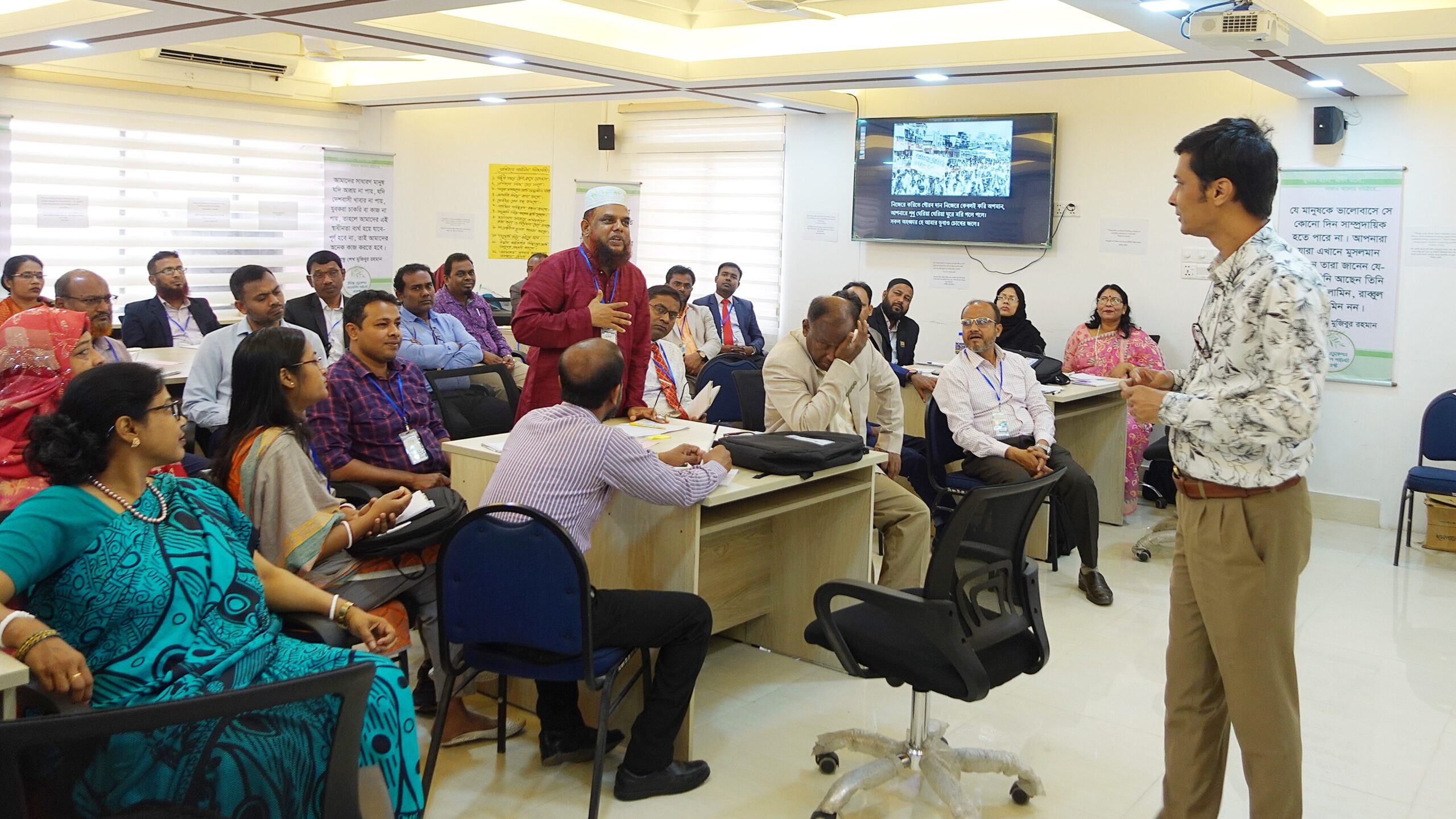
Training Workshop for Teachers
The training workshop for teachers took place from 22 to 26 February 2023. The local fellows, a group of five educators and ministry representatives, facilitated the workshop. The fellows play a pivotal role in leading the training, delivery, and advocacy efforts within the country.
Additionally, Ms. Eleonora Mura, Senior Expert on Monitoring, Evaluation, and Learning from Arigatou International, provided support and guidance to the fellows during the workshop.
The opening ceremony of the training workshop featured keynote speeches by Dr. Suleman Khan, Secretary for Secondary and Higher Education, and Mr. Md. Belayer Hossain Talukdar, Additional Secretary. They emphasized the importance of ethics education in fostering critical thinking, and positive relationships, and implementing Global Citizenship Education. They also highlighted how the ongoing curriculum reform in Bangladesh has integrated ethics as a vital component, which is being incorporated into grades 1 and 2, as well as 6 and 7.
During the workshop, participants explored the Ethics Education Conceptual Framework, centered around three pillars: Relationships, Ethical Reflection and Dialogue, and Collective Action. Ms. Amina Begum, Senior Teacher of Bengali at Biddamoye Govt. Girls School, shared her perspective, stating, “The concept of dialogue and a safe learning environment are very meaningful aspects that will help me prepare and implement ethics education with children.”
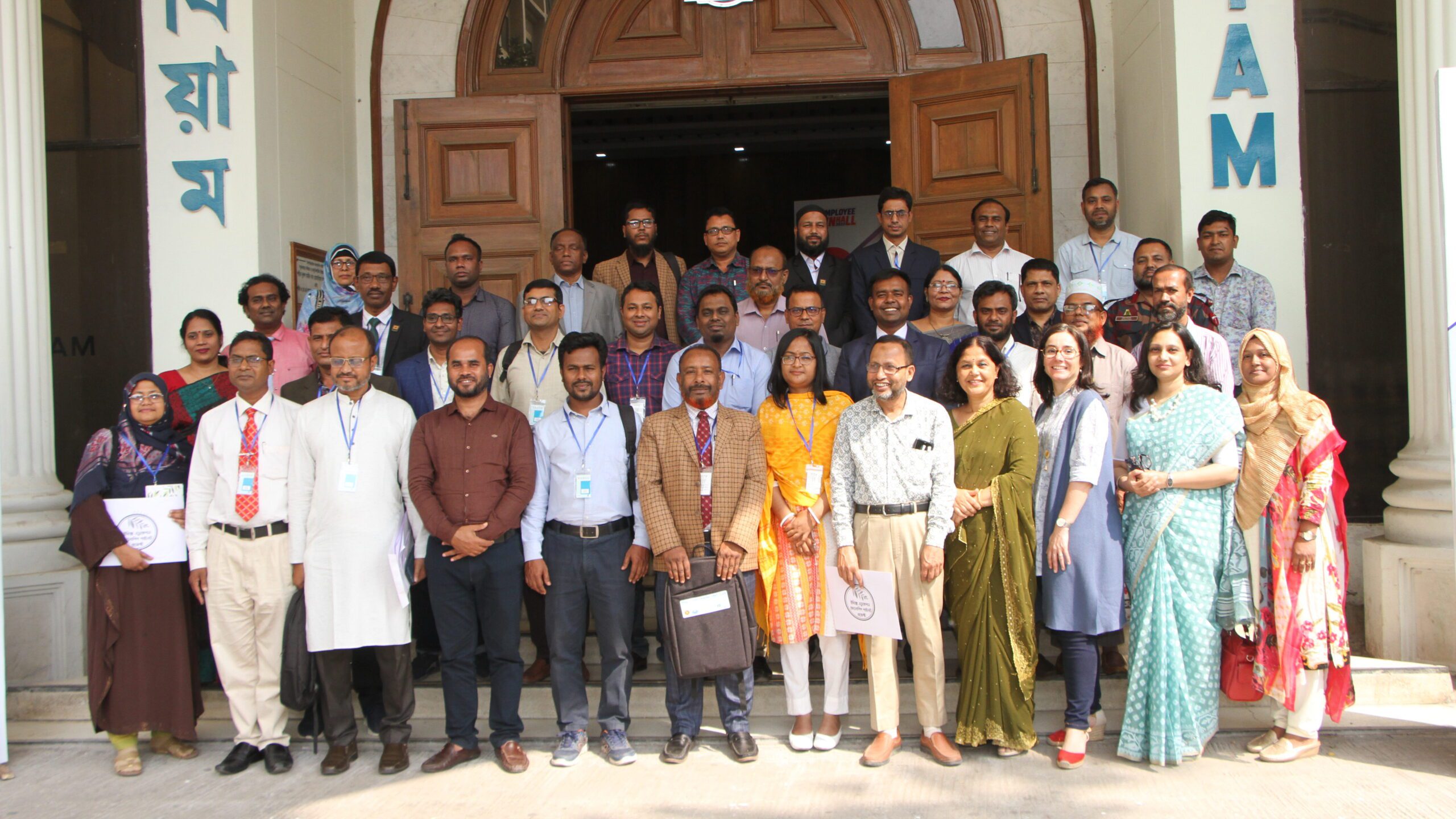
A Transformative Impact on Teachers
After completing the workshop, the trainees expressed how the transformative pedagogy approach presented in the program empowered them to critically question their assumptions and biases. They felt encouraged to examine the root causes of social injustices and take action to create a more just and equitable society. The teachers recognized their potential as powerful advocates for change within their schools and communities, driving improvements in education at all levels.
Mr. Joydip Dey, one of the program fellows, highlighted the significant benefits brought about by the program. He pointed out, “In our previous education system, there was a heavy emphasis on rote learning, resulting in students being fed pre-structured ideas. Unfortunately, this approach sometimes contributed to increased intolerance in society. However, with the introduction of the new curriculum, we are now prioritizing independent thinking among learners, which strongly aligns with the principles of ethics education. It is indeed a crucial time to implement ethics education in Bangladesh.” Mr. Dey is an Assistant Professor at the Government Teachers Training College in Dhaka and a member of the subject committee of the National Curriculum Framework.
The implementation of the program with children in schools began in March, yielding highly positive responses from teachers, with significant engagement observed among the participating children.
We extend our sincere appreciation to the dedicated fellows: Ms. Geetanjali Barua, Mr. S.M. Shafiul Alam, Mr. Zonayed Ahmed, Mr. Joydip Dey, and Dr. Syed Mizanur Rahman. We also thank all the individuals and organizations involved in the successful execution of the Ethics Education Fellowship program in Bangladesh, and the teachers for their commitment and enthusiasm.
The post The Ethics Education Fellowship Makes Strides in Bangladesh appeared first on Ethics Education for Children.
05/06/2023 - Indonesian Teachers Complete the Training Phase of the Ethics Education Fellowship Program
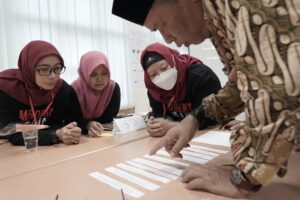
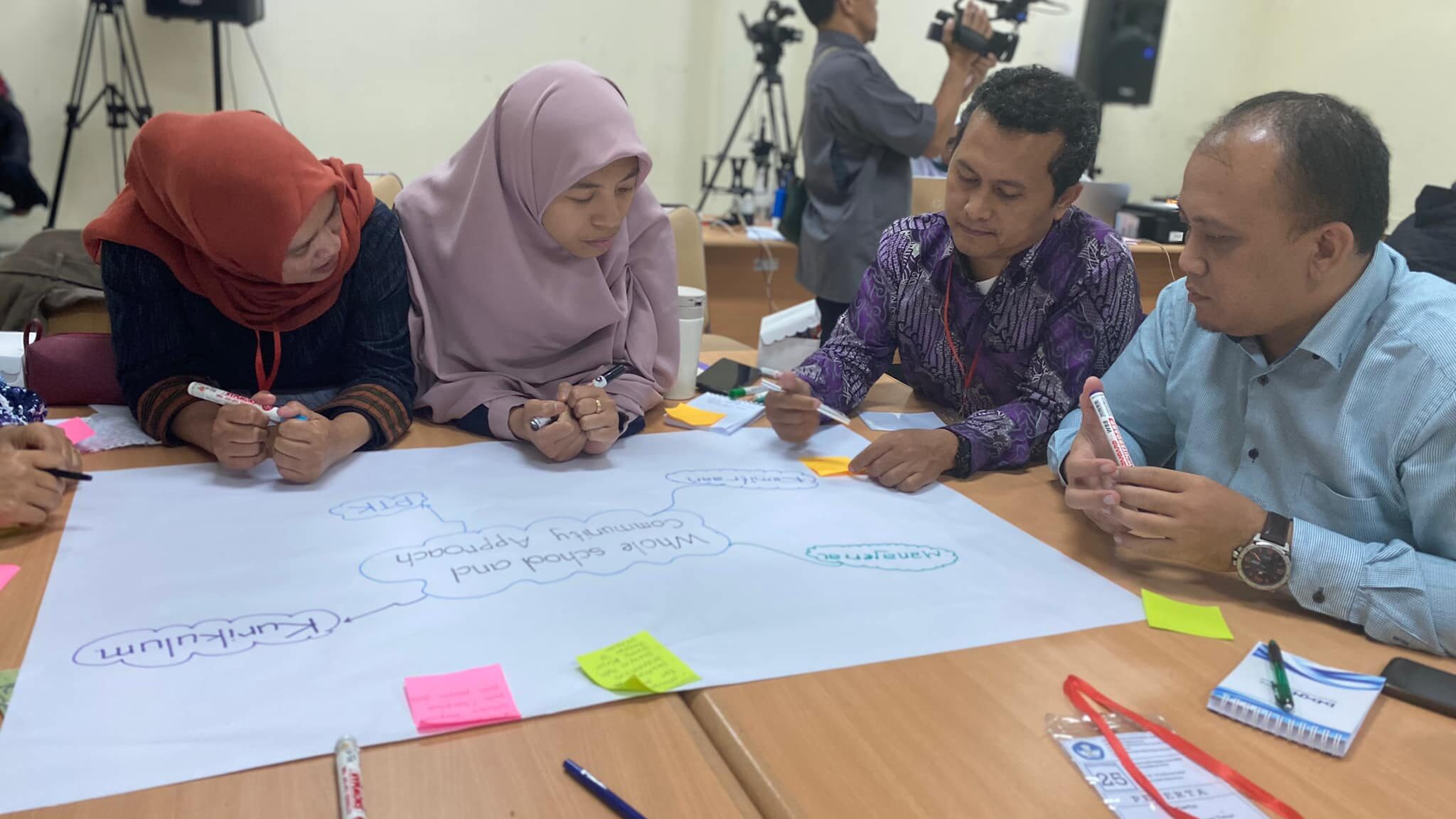
The training workshops for teachers under the Ethics Education Fellowship, concluded successfully in Indonesia, reaching 200 participants from five regions. The teachers received specialized training through engaging activities, equipping them with the necessary skills and knowledge to implement ethics education programs in their local schools. It is estimated that these teachers will reach 1,500 students by the end of 2023.
A Collaborative and Multistakeholder Journey
Designed to strengthen the sustainable delivery of ethics education programs for children, the Fellowship invites teachers to prepare and facilitate a learning journey for children. This approach helps learners to develop positive relationships with themselves and others, engage in ethical reflection and dialogue, enhance their ability to learn to live together and develop collective actions to make positive impacts in their communities.
The Ethics Education Fellowship is being carried out simultaneously and collaboratively in Bangladesh, Indonesia, Kenya, Mauritius, Nepal, and Seychelles. The program operates on a fellowship structure, where dedicated representatives from each country play a key role. These fellows lead the national efforts by organizing training workshops for teachers, ensuring the successful implementation of ethics education programs with children, and advocating for the importance of ethics education on a national scale. Furthermore, the fellows have established a Global Community of Practice to learn from each other, collaborate and support the expansion of the program.
This program is a collaborative effort involving Arigatou International, the Guerrand-Hermès Foundation for Peace, the KAICIID International Dialogue Centre, the Muslim Council of Elders, and UNESCO, which is represented by the UNESCO Regional Office for Eastern Africa and the UNESCO New Delhi Cluster Office. The process is supported by the National Commissions for UNESCO of Indonesia and Kenya. The program is being led in each country by the ministries of education, through the fellows, a group of educators and ministry officers, that were trained as teacher trainers back in October 2022.
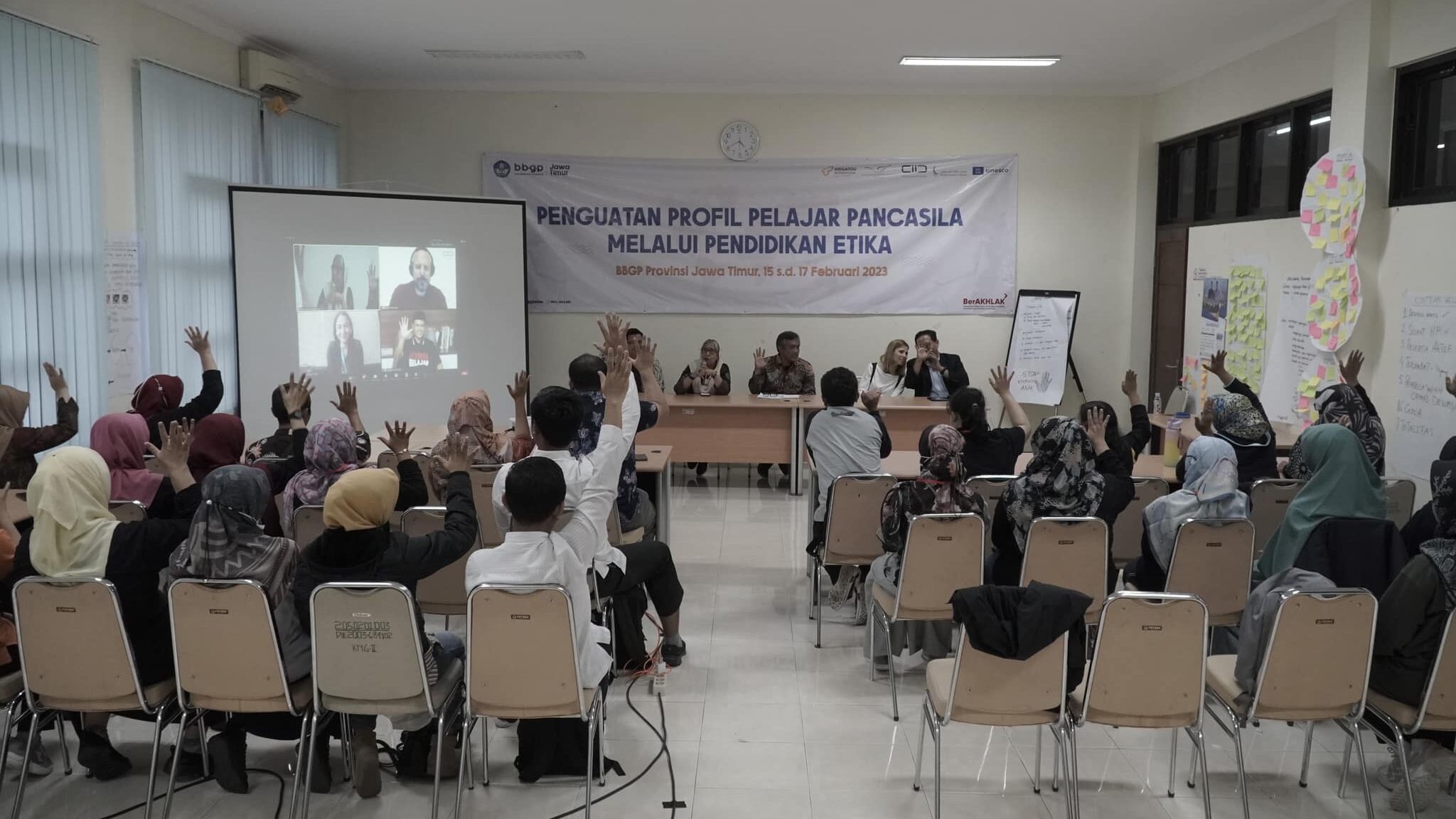
Empowering Teachers through Training in Indonesia
The training program for Indonesian teachers consisted of two phases. The first phase, a hybrid workshop held in Suravaya in February 2023, brought together 67 participants from various regions. Over three days, participants had the opportunity to share their experiences, discuss critical issues affecting learners, and explore the role of education in addressing these challenges. Key topics included discrimination, stereotypes, violence, and their impact on children’s lives in schools.
Participants explored the Ethics Education Conceptual Framework which is built around three pillars: Relationships, Ethical Reflection and Dialogue, and Collective Action. They reflected on what ethics means in their lives and their interactions with others, and on the ethical challenges they, the children and their communities face. While doing it, participants identified how ethics education programs can foster transformation in children by encouraging ethical reflections and engaging them in dialogue with others.
“The workshop provided extraordinary benefits to me personally. Now I better understand how an educator should be a role model for students, especially in the classroom,” said one of the teachers, while highlighting the importance of learning to respect each other, and accept our differences.
Teachers explored the alignment between the transformative pedagogy approach and the Pancasila principles of the Indonesian Constitution. They also recognized the critical significance of interreligious and intercultural dialogue and its practical implementation in the classroom.
Dr. Itje Chodidjah, Executive Chair of the Indonesian National Commission for UNESCO, Ministry of Education, Culture, Research and Technology, Indonesia, emphasized the relevance of the Fellowship during her opening remarks at the workshop. She highlighted the program’s connection to the Pancasila ideology and expressed her commitment to supporting the Fellowship at the national level.
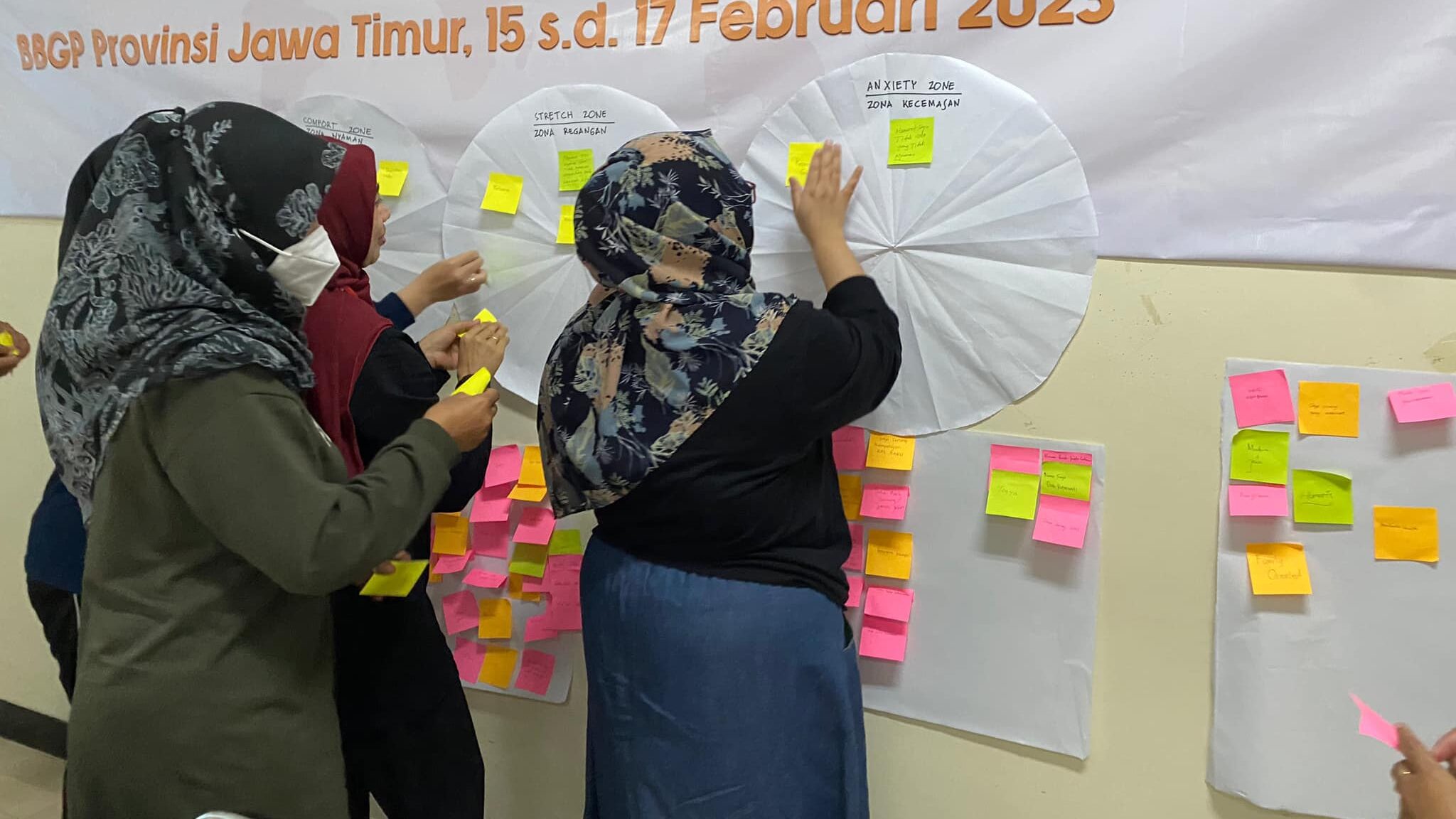
In May 2023, the second phase of the program took place with onsite workshops in five different regions: Sorong Regency, West Java, West Kalimantan, South Sukawesi, and East Java. These workshops focused on building teachers’ capacity to foster positive relationships and empower learners to create inclusive, respectful, and resilient societies. Teachers received guidance on implementing ethics education programs across various grade levels, from kindergarten to elementary, junior, and senior high school.
“For the Indonesian context, the workshop is very enriching because the experiences the teachers had is in line with their needs in the implementation of the Pancasila Students’ Profile Project. The workshop helped teachers understand more about ethics education, and more importantly, it enlightened them to make ethic education more visible and practical in their classroom,” shared Ms. Euis Lesmini Djuanda, School Principal and Fellow.
Looking Ahead
The trained teachers are now prepared to implement ethics education programs in their respective regions, positively influencing the lives of children in Indonesia. The Ethics Education Fellowship remains committed to its mission of nurturing global citizenship, building inclusive societies, and preparing students to tackle ethical challenges as active and responsible citizens.
Our gratitude goes to the fellows and all organizers who have supported the training program for teachers in Indonesia.
The post Indonesian Teachers Complete the Training Phase of the Ethics Education Fellowship Program appeared first on Ethics Education for Children.
10/03/2023 - The Rights of the Child and the Digital Environment – A Statement at the 52nd Session of the Human Rights Council

Arigatou International joined the United Nations Committee on the Rights of the Child to call for the inclusion of religious leaders and parents in training about the rights of children in the digital environment and to collaborate with them.
The statement was delivered by Ms. Emma Nowotny, Child Rights Program Officer, on 10 March 2023, during the Annual Day on Children’s Rights at the 52nd session of the Human Rights Council.
This year, the theme of the Annual Day was The Rights of the Child and the Digital Environment. Through the statement, Arigatou International called on governments, decision-makers and civil society to “invest in educational programs and spaces that empower children to take an active role in the digital environment and become positive influencers among peers.”
Human Rights Council 52nd session
Annual Discussions on the Rights of the Child
10 March 2023
Distinguished panelists,
Arigatou International welcomes the discussions on child rights and the digital environment and the important views and recommendations that children shared.
In line with General comment No. 25 (2021), we call for a holistic approach to maximize the benefits and minimize the risks that the digital environment presents, to ensure that violence against children is addressed properly and mitigated.
Legal protection is crucial for a safe digital environment, but we must also prioritize combating the normalization and stigma of online violence and its intersection with other types of violence.
We, therefore, call on governments, decision-makers and civil society to:
1. Develop training for those closest to children and with the moral authority to intervene and support, namely religious leaders, parents, caregivers and educators to learn about the rights of children in the digital environment, understand the risks and linkages with other violence, recognize the early signs of child’s victimization, and reporting mechanisms. We call particular attention to the role of religious leaders in many parts of the world, who are well-positioned to influence their believers and protect children. Religious communities are the largest and most connected grassroots organizations in the world, and with an immense potential to support and influence social change.
2. Invest in educational programs and spaces that empower children to take an active role in the digital environment and become positive influencers among peers. This requires providing them with the space to take joint action to address hate speech and the spread of extreme ideologies, protect themselves against violence and abuse, speak up for others, and understand their rights, including in the digital environment. Ethics education programs that support the development of critical thinking, intercultural and interreligious competencies, and foster empathy and individual and collective responsibilities, have proved effective in empowering children and youth as agents of change.
To conclude, we invite all States and organizations present here to use a multi-sectoral approach to create synergies to develop more effective mechanisms to protect and empower children. It is our ethical responsibility to move beyond working in silos and collaborate.
Thank you
Arigatou International
The post The Rights of the Child and the Digital Environment – A Statement at the 52nd Session of the Human Rights Council appeared first on Ethics Education for Children.
09/03/2023 - Developing Policy Recommendations to Advance Faith-sensitive Mental Health and Psychosocial Support for Children on the Move


Over 150 policymakers, faith actors, representatives of governments and UN agencies and other humanitarian actors got together to produce concrete policy recommendations to advance faith-sensitive mental health and psychosocial support for children on the move.
UNICEF estimates that 37 million children are on the move in the world today. Children affected by forced migration and displacement are one of the most vulnerable groups, suffering from multiple violations of their rights and experiencing stressful and traumatic conditions that have a severe impact on their psycho-social well-being.
The rapid increase in child migration in the last decade has highlighted the need to set up specific policies and frameworks to protect children on the move.
While mental health and psychosocial support of children on the move have been at the center of many effective approaches to enhance the protection and well-being of migrant children, faith-inspired psycho-social support frameworks have been largely overlooked.
“We need to meet people, children included, where they are at. We need to listen, learn, seek to understand and tailor our approaches. We need to make sure that policy leaves room for taking into consideration the religious and spiritual experience of the population in question,” stated Ms. Stephanie Shanler, Child Protection Specialist at UNICEF, during the roundtable discussion focused on Syria.
Faith-sensitive mental health and psychosocial support approaches play a crucial role in ensuring the well-being of children on the move. Spiritual nurture supports children’s resilience, acting as a protective factor positively affecting trauma responses during displacement.
Three roundtable discussions dedicated to producing policy recommendations were organized between December 2022 and February 2023. The discussions focused on the countries of the Northern Triangle in Latin America (Guatemala, Honduras and El Salvador), Syria and Ukraine.
“It is not ‘faith-sensitive’ in terms of knowing everything about religious expression. It is very much about listening and asking questions. So much of the guidelines (Faith-Sensitive Approach in Humanitarian Response) is about mapping, assessing, listening, identifying,” highlighted Professor Alastair Ager, Director of the Institute of Global Health and Development at Queen Margaret University, at the Roundtable focused on the Ukraine crisis.

These roundtables were organized under the umbrella of the Partnership on Religion and Sustainable Development (PaRD) and sponsored by GIZ. They were co-hosted by Arigatou International, the Institute for Global Health and Development at Queen Margaret University, the United States Institute of Peace, World Vision International, KAICIID Dialogue Center, Islamic Relief Worldwide, the Network for Traditional and Religious Peacemakers and Syria Bright Future for the roundtable in Syria.
“We recognized, as we started rolling out the program, that faith leading was needed, especially as it was one of the few positive things in a child’s life that they could hold on to, that can propel positive behavior,” said Christalle Gemon, when sharing about her experience working with children and youth at the UNDP Trinidad and Tobago Accelerator Lab.
The first phase of this project took place back in 2021 when a series of three webinars were organized for educators and policymakers working with migrants and refugees in Europe. A booklet titled Solidarity: Advancing the Role of Education in Fostering Migrant and Refugee Inclusion in Europe, was launched in November 2021 as part of the project. The booklet builds on the reflections and recommendations collected during the series of webinars.
The policy discussions helped translate the knowledge and best practices outlined in the booklet into concrete policy recommendations. A policy brief will be developed in the first half of 2023 to inform the efforts of host governments and other relevant stakeholders in supporting, adopting and implementing faith-sensitive mental health and psychosocial support approaches as part of a broader strategy to foster peacebuilding and sustaining peace.
The post Developing Policy Recommendations to Advance Faith-sensitive Mental Health and Psychosocial Support for Children on the Move appeared first on Ethics Education for Children.
02/06/2022 - Members of GNRC-Guatemala Participate in a Training Workshop

A group of 14 educators and representatives of organizations participated in a training workshop on the Learning to Live Together program in Guatemala.
The workshop was held in a blended format in Guatemala City on 9, 10, 11 and 13 May 2022. The activity sought to train facilitators belonging to Puerta de Esperanza, Fe y Alegría and ODHAG, both members of the Global Network of Religions for Children (GNRC) in Guatemala.

During the workshop, the participants were able to become familiar with the main concepts of the Learning to Live Together program, its methodologies and its educational approach. “I found particularly interesting that with this approach children are at the center. It reflects on their realities, it provokes transformation,” asserted a participant.
The participants reflected on the violence that affects children and adolescents in the contexts in which they work, and the role that values-based education can play in promoting peace and resilience. “Educating is not just being in front of a group of students, but living together in unity and fraternity,” shared another participant at the end of the workshop.
The workshop is part of a project carried out by Puerta de Esperanza with the support of Toybox, an international NGO that has been working for more than 25 years to help children and young people around the world get off the streets. The project aims to strengthen the protection and resilience factors in children and adolescents who work, live or operate in the “Mercado La Terminal, zone 4” of Guatemala City, through the implementation of Learning to Live Together and its transformative pedagogy.
We thank the facilitators and participants for their commitment and enthusiasm. We hope that this training workshop can provide a basis for the implementation of the project with the children of Guatemala.

The post Members of GNRC-Guatemala Participate in a Training Workshop appeared first on Ethics Education for Children.
29/04/2022 - The Convergence of Science and Theology: Activating the Catholic Church to invest in young children globally

Ms. Maria Lucia Uribe, Executive Director, Arigatou International Geneva, was invited to take part in The Convergence of Science and Theology: Activating the Church to invest in young children globally. The colloquium was held from 25-26 April 2022 and organized by the University of Notre Dame’s Global Center for the Development of the Whole Child (GC-DWC).
The Convergence of Science and Theology colloquium will advance a theological and scientific basis for integrating early childhood care and education into faith-based systems and for sharing and synthesizing lessons learned to date. Participants examined how faith-based systems can be used as effective and scalable change-drivers to increase equitable access to early childhood development and learning opportunities in low-resource countries.

This year’s colloquium focused on the Catholic parish as the unit of change. Global invitees included clergy, academics, and practitioners. This conference focused on bringing together theological and scientific knowledge about early childhood development with parish-based programs working in the home, church, and school to improve outcomes for young children.
Ms. Uribe was invited to share the work of the International Consortium on Nurturing Values and Spirituality in Early Childhood for the Prevention of Violence during the opening ceremony of the colloquium.
Ms. Uribe presented the toolkit on Nurturing the Spiritual Development of Children in the Early Years, its process of development and how it aims to support violence prevention and children’s holistic well-being. The toolkit is meant for faith communities and faith-based organizations to support caregivers in promoting nurturing care and positive parenting practices through play, positive experiences, and safe and empowering environments. She shared that the toolkit will be launched at the end of 2022, allowing its scale-up through the major faith-based organizations in the world and in collaboration with international organizations such as UNICEF and many other partners.
Ms. Uribe explored opportunities for collaboration with the Global Center for the Development of the Whole Child in the framework of the development of the toolkit as well as possibilities to join efforts with other organizations to pilot the implementation in 2023.

The meeting ended with concrete ideas and reflections on research, policy, advocacy and program implementation to activate the role of faith actors in investing in early childhood development and education for children.
We thank the Global Center for the invitation and the opportunity to collaborate.
The post The Convergence of Science and Theology: Activating the Catholic Church to invest in young children globally appeared first on Ethics Education for Children.
08/04/2022 - Workshop in Rome: Students Feel Empowered to Help Create a Culture of Encounter in their Communities

Arigatou International – Geneva, together with Scholas Occurrentes and Ashoka – Italy, carried out a three-day workshop for a group of 15 teachers and 25 students from three secondary schools in Rome, Italy.
The workshop, held on 6-8 April 2021, is part of “Creating a Culture of Encounter,” a collaborative project being held in Greece, Italy, Portugal and Spain, that seeks to empower youth through education to challenge xenophobia, discrimination and exclusion in Europe.
During the workshop, teachers and students reflected together on different thematics including identity, ethics, values, and the appreciation of diversity. They discussed youth empowerment and explored different ways of promoting joint actions to contribute to challenging the mistrust between communities, creating new narratives of mutual understanding and respect, and enhancing solidarity across Europe.
“I would like to continue with this project; with these moments of encounter and dialogue where we appreciate diversity and feel a call to embrace diversity reflecting on the rich social identity we can build,” said one of the educators.

Throughout the workshop, students and teachers gained new knowledge, developed attitudes and skills, and learned to utilize intercultural and interfaith tools to help co-create a culture of encounter in Europe. The participatory approach of the workshop allowed them to experience active citizenship, encouraging them to actively engage with communities and to question and transform the narratives of hate speech and discrimination, thus contributing to the prevention of violence. They also took part in a Storytelling session to learn to document their experiences and the processes and outcomes of their projects.
“These days have given me home that schools can become places for encounter and enriching experiences where through dialogue and exchange we can reflect on things around us. This should be the school! A school where we are protagonists and we feel empowered to change the world around us!” express another student.
After the workshop, students were inspired and committed to carrying out local projects to reach out to their schools and communities and initiate youth-led projects with a potential multiplying effect to reach more young people in their countries. In the same way, teachers were encouraged to support and guide the students in the development of collaborative actions.

The “Culture of Encounter” project seeks to advance the promotion of human rights, the principles of democracy and the value of learning to live together in plural societies. By June 2022, it will have reached one hundred youth aged 14 to 17 and sixty educators from the participating countries.
The Project is being organized by Arigatou International – Geneva, Scholas Occurrentes, the Aga Khan Foundation, the European Wergeland Centre, and the Guerrand-Hermès Foundation for Peace Research Institute.
We thank the team of facilitators that made this workshop possible, as well as the teachers and students for their commitment and enthusiasm.
The post Workshop in Rome: Students Feel Empowered to Help Create a Culture of Encounter in their Communities appeared first on Ethics Education for Children.
22/03/2022 - Investing in Integrated Services to Prevent and Respond to Violence against Children: A conversation at the margins of the Human Rights Council

More than 187 people tuned in for the panel discussion “Investing in Integrated Services to Prevent and Respond to Violence against Children,” held online on 17 March 2022 at the margins of the 49th Human Rights Council.
The event was organized by the Office of the United Nations Special Representative of the Secretary-General on Violence against Children and the Child Rights Connect Working Group on Children and Violence, composed of 17 civil society organizations, co-convened by Arigatou International – Geneva and World Vision International.
During the discussions, member states, UN entities, civil society and children themselves shared their experiences and perspectives on assessing the cost of violence, as well as the dividend paid by spending on effective violence prevention.
Ms. Maria Lucia Uribe, Executive Director of Arigatou International Geneva welcomed the participants highlighting the Working Group’s commitment to contribute to advancing the 2013 Agenda for Sustainable Development, in particular the goals and targets related to preventing violence against children.

The panel discussion was moderated by Dr. Najat Maalla M’jid, United Nations Special Representative of the Secretary-General on Violence against Children. In her opening remarks, she stressed how violence against children is increasing more and more, but at the same time, it is becoming less visible.
She ensured that all forms of violence against children can be stopped. “Yes, we can stop violence against children because we know what to do and how to do it. We need to invest in cross-sectoral integrated services that are child and gender-sensitive and inclusive, with access to all children, independent of their status,” she stated.
Speakers discussed how investing in integrated services to prevent and respond to violence against children is essential to realizing children’s rights, enhancing accountability and ensuring sustainable human capital development. They also highlighted the importance of mobilizing all key stakeholders, including children themselves.
“Decisions concerning our own safety and well-being, lie not in our hands, but in the hands of adults,” said Ojaswi, a 17-year-old girl from India, reflecting on how providing a platform for children’s meaningful participation is one of the biggest steps to ending violence against children by 2030. She called on decision-makers to listen to children and to include them in the discussions of issues that affect them. “We are not just your future, we children exist now and we are an as larger part of the present as you are (…) So include us, children, in the fight for our rights and well-being,” she concluded.
Januka, a young activist from Nepal, stressed that having policies and guidelines is not enough. The programs need to be implemented to have a real impact: “There is a strong base in Nepal for child participation, but we also face many challenges. Despite good guidelines and policies, the most challenging issue is implementation,” she explained.
Panelists also included Ms. Maria do Livramento Silva, President of the Cabo Verde Institute of Child and Adolescence, Ministry of Family, Inclusion and Social Development; Mr. Mohammed Meqdady, Secretary-General of the National Council for Family Affairs, Jordan; Ms. Dana Buzducea, Partnership Leader, Advocacy and External Engagement, World Vision International, and Mr. Cornelius Williams, Director of Child Protection, UNICEF.

During the discussion, panelists spoke of the devastating and long-lasting effects of violence on children, families and societies as a whole. Investing in integrated services for children was presented as a high-return solution, which must be seen as an integral part of implementing the Convention on the Rights of the Child and every government’s overall economic growth and development strategy. It is also a cornerstone of implementing the 2030 Agenda for Sustainable Development.
The full recording can be found HERE.
We thank the panel of speakers for sharing their knowledge, reflections and good practices; and the attendants, for their interest in stopping violence against children.
The post Investing in Integrated Services to Prevent and Respond to Violence against Children: A conversation at the margins of the Human Rights Council appeared first on Ethics Education for Children.
16/03/2022 - The Ethics Education Fellowship Program: Creating a Platform for Sharing and Building Capacity within Ministries of Education

Representatives from ministries of education, intergovernmental organizations, multilateral agencies, civil society organizations and research institutions are collaborating in the development of a fellowship program on ethics education.
The purpose of the Ethics Education Fellowship Program is to strengthen the capacity on ethics education in formal educational settings as a key contribution to developing national programs that foster learning to live together through intercultural and interfaith education. The Fellowship Program targets representatives from ministries of education or other government offices from six countries in Africa and Asia, that are interested in ethics education to foster learning to live together and social cohesion in their countries.
By creating a network of formal education institutions and a platform for sharing and building capacity within the ministries of education, the Fellowship Program seeks to promote a sustainable continuation and expansion of ethics education activities in the participating countries.
The partners include Arigatou International, Guerrand-Hermès Foundation for Peace – Global Humanity for Peace Institute, Higher Committee for Human Fraternity, KAICIID International Dialogue Centre, UNESCO Office for Eastern Africa and the UNESCO New Delhi Cluster Office; Indonesia National Commission for UNESCO – Ministry of Education of Indonesia; Kenya National Commission for UNESCO – Ministry of Education of Kenya, and Sri Lanka National Commission for UNESCO – Peace and Reconciliation Unit, Ministry of Education of Sri Lanka.
The project, which is being convened by Arigatou International – Geneva, was kicked off with a partners’ meeting in Geneva, Switzerland on 7 – 8 March 2022. Representatives from each partner organization participated in the meeting, where they had the opportunity to discuss the common vision of the collaboration. A technical team was formed to carry out the action plan of the Fellowship Program and its implementation. It is expected that national consultations will take place in each of the participating countries to assess needs and opportunities, and to define their scope of implementation. The first international capacity building workshop will take place in October this year, followed by national training workshops for educators, and subsequent implementation in schools. A review meeting will take place in 2023 to share experiences, lessons learned and further the project.
At the end of the meeting, there was general excitement about the diverse expertise of the partner organizations as well as the potential to contribute towards the implementation of the Sustainable Development Goals, notably target 4.7 which aims to support global citizenship education and a culture of peace.
This collaboration was initiated as a follow-up to the Global Symposium, Transforming Education held online on 22-23 November 2021.
We thank our partners for walking with us on this new project. We look ahead to helping promote ethics education into national education policy and programming to collectively contribute to building more peaceful, inclusive, and cohesive societies.
The post The Ethics Education Fellowship Program: Creating a Platform for Sharing and Building Capacity within Ministries of Education appeared first on Ethics Education for Children.
03/03/2022 - A Global Listening Initiative Engages over 2000 Children and Youth

Arigatou International Geneva organized four focus group meetings with children from Brazil, Indonesia and Portugal in the framework of the G20 Interfaith Forum (IF20) through its Education Working Group.
The IF20 offers an annual platform for religious, faith and interfaith organizations communities to constructively engage with the agendas set by the G20 leaders. For 2021, the G20’s agenda focuses on People Planet Prosperity, and the IF20 dedicates its reflection and dialogue on the theme of A Time to Heal.
To understand the perspectives of children on how education can contribute to the challenges presented by the COVID-19 pandemic, the IF20 Education Working Group, of which Arigatou International Geneva is a member, launched a Global Listening Initiative (GLI). Over 2000 young people aged 14-19 from 26 countries participated in the initiative, identifying actions for educational transformation, and providing key information on their lived experiences in diverse contexts.

The participants were invited to reflect on their experiences of life and education during the Covid-19 pandemic; identify who and what have been most supportive to their learning and well-being; and propose educational policy priorities that can explicitly support their healing, learning and flourishing.
The focus group meetings organized by Arigatou International Geneva brought together 46 children aged 14 to 18 from Christian, Jewish and Muslim communities, and over 12 accompanying adults including teachers, social workers and non-formal educators working with children in the framework faith communities.
The meeting in Brazil was organized in collaboration with Ms. Shirley Jungman and with youth and educators from Lar das Crianças da congragação Israelista Paulista. In Indonesia, in collaboration with Mr. Fendra Kus Nuryadi and Ms. Wati Wardami and with students and educators from eight different schools. In Portugal, it was organized in collaboration with Mrs. Manuela Leal from Apostolate Mouvement of Children, as well as with youth from the Professional School Vértice and the support of Mrs. Caroline Gomes.

On 28th September, an IF20 high-level dialogue took place on Zoom, chaired by the IF20 Vice President, Professor Katherine Marshall. National politicians, interfaith leaders and international educational directors drew on their expertise and experiences and explored how these priorities and proposed action might be meaningfully integrated into relevant contexts. Most importantly, selected young people who took part in the Global Listening Initiative joined global leaders and shared their voices and their rationales for such policy priorities and subsequent action.
Arigatou International Geneva supported the preparation of the children and young people attending the event to be active and engaged participants during the meeting.
The dialogue aimed to discuss policy recommendations together with young people, government representatives, religious leaders and civil society representatives. The meeting moderated by Dr. Katherine Marshall, was attended by the Finland State Secretary, the Deputy Minister of Education of Portugal, a member of the Argentinian Parliament, as well as by the President of the Global Tolerance Council in the UAE, among others.

The post A Global Listening Initiative Engages over 2000 Children and Youth appeared first on Ethics Education for Children.
02/03/2022 - Third Online Course on Ethics Education for Children Reaches Educators from 32 Countries

Following the success of Arigatou International’s previous online courses, the third round of Ethics Education for Children: A Transformative Pedagogy for Learning to Live Together was conducted from 15-28 June 2021. Sixty-six participants from different countries joined the course, offering a diversity-rich environment that helped prompt fruitful dialogues and a diverse exchange of experiences.
During the course, participants explored how to create safe learning environments for children, particularly in the context of the COVID-19 pandemic, and with the challenge of school’s closures and distance learning, among other limitations. They discussed the ethical challenges brought by the pandemic and its implications for children and youth in their own contexts and explored ways to empower children in addressing these issues.
Participants were introduced to Arigatou International’s Ethics Education Approach, which presents a transformative pedagogy that places children at the center of the learning process, making them drivers of their own learning and agents of positive change in their communities. During the sessions, participants discussed how educators can empower children by ensuring their meaningful participation and providing physical, emotional and spiritual safety.
As part of the course, a webinar was held to reflect on the importance of ethics education for children, particularly during the pandemic. Speakers included Dr. Scherto Gill, Guerrand-Hermes Foundation for Peace; Dr. Xiaoan Li, The Fetzer Institute; Ms. Lilis Musyaropah, Teacher Associated Schools of UNESCO; Prof. Amr Abdalla, University for Peace, and Dr. Vinu Aram, Shanti Ashram.
This series of online courses is part of our response to the COVID-19 pandemic to support educators in ensuring children’s social, emotional and spiritual well-being through reflections and tools to foster ethics education. The course was coordinated and facilitated by Mr. Suchith Abeyewickreme, Program Officer of Arigatou International Geneva, Ms. Jane Nyaga, Senior Officer at the Kenya Institute for Curriculum Development, and Ms. Laura Molnar, President of Education for Change, Romania and GNRC member.
The post Third Online Course on Ethics Education for Children Reaches Educators from 32 Countries appeared first on Ethics Education for Children.
02/03/2022 - Geneva Peace Week 2021: Prevention of Violence Against Children in the School Environment

In the framework of Geneva Peace Week 2021, Arigatou International and Safe to Learn organized the workshop Prevention of Violence Against Children in the School Environment to raise awareness of the impact of violence in school settings.
The session highlighted the importance of safe learning environments for children’s development and well-being. Participants helped brainstorm practical and innovative solutions to respond and prevent violence in schools.
The workshop took place on 1 November 2021 with the participation of 50 participants from over 20 countries. Facilitators shared the ethics education framework as a pedagogical tool for creating safe learning environments free of violence and developing competencies in educators to empower children to positively reflect and address violence around them.
The interactive workshop provided opportunities for participants to discuss and challenge social norms and behaviors that condone violence in schools and collectively explore methodological approaches that promote positive practices and inclusive educational spaces.

The workshop was facilitated by Ms. Anne Waichinga, Education and Child Protection Specialist – Kenya; Ms. Laura Molnar, President Education for Change Association – Romania; Mr. Vijayaragavan Gopal, Head of the Youth Leadership Program, Shanti Ashram – India; Ms. Zvonimira Jakic, youth Advisor of the Presidency – Bosnia & Herzegovina; and Ms. Vera Leal, Senior Ethics Education Program Officer, Arigatou International Geneva.
The session was moderated by Ms. Maria Lucia Uribe, Executive Director, Arigatou International Geneva. Concluding remarks were provided by Dr. Chloë Fèvre, Director, Safe to Learn Global Initiative.
Geneva Peace Week is a leading annual forum in the international peacebuilding calendar and the flagship event of the Geneva Peacebuilding Platform. The thematic focus on 2021 was “From seeds to systems of peace: Weathering today’s challenges.”
We thank the panel of facilitators for their commitment and support, and the participants for their enthusiastic engagement.
The post Geneva Peace Week 2021: Prevention of Violence Against Children in the School Environment appeared first on Ethics Education for Children.
02/03/2022 - Discussing Child Participation and Empowerment at the Faith and Child Safeguarding Summit

Arigatou International supported the organization of the Faith and Child Safeguarding Summit a platform for religious institutions, faith-based organizations, academics, and religious leaders to come together, exchange insights, experiences, challenges and best practices on child safeguarding in religious and faith-based contexts.
Spread over 4 days, with 93 international speakers, and nearly 2,000 attendees, this summit ran from 8-11 November 2021 and was specifically designed to help give faith organizations a platform to demonstrate their commitment to child safeguarding.
Ms. Maria Lucia Uribe, Executive Director of Arigatou International Geneva moderated an inter-faith panel titled Faith, Spirituality and Child Safeguarding: An interfaith conversation around preventing Spiritual Abuse on 08 November.
“There is a critical need to protect children who are victims of spiritual abuse, and therefore to create mechanisms or systems to ensure their protection. We also need to empower children to speak up to protect others and to develop their resilience,” she said in her opening remarks.
The discussion included Dr. Denise Ziya Berte, Ph.D., Executive Director at Peaceful Families Project; Rabbi Diana Gerson, Associate Executive Vice President at New York Board of Rabbis, and Dr. Patricia Espinosa Hernández, member of the CEPROME Latin-American Council.
The dialogue focused on spiritual abuse, coercive control and abuse of power in religious institutions. It provided a space for deepening the understanding of spiritual abuse, and for sharing strategies for detecting it and addressing it.

The panel contributed to identifying actionable recommendations and building on promising practices of Christian, Jewish and Muslim communities across the world, to disrupt the chain of harm, reaffirming imperatives for protection, and standing against the perpetration, enabling, or silencing of spiritual abuse.
An inter-faith panel moderated by Ms. Silvia Mazzarelli, Regional Coordinator Global Network of Religions for Children for LAC, and Ms. Vera Leal, Senior Education Officer at Arigatou International Geneva was held on 11 November. The session was titled Enhancing Child Safeguarding in Faith Communities through Child Participation: Multi-faith Perspective Across Regions, and it looked at child participation as a central pillar of child safeguarding.
Members and partners of the Global Network of Religions for Children (GNRC) in Africa, Latin America and Southeast Asia, shared their experiences on the practical application of child participation and implications on violence prevention and response, in Buddhist, Christian and Muslim communities.

The panel was composed of Mr. Guillermo Niño Fernández, Pastor, Methodist Church of México; Zam Obed, Field Officer, Childslife-Kenya; Ms. Azam Sahih de Matin, founder of the Institute of Education in Virtues for Human Development, and Ms. Opor Srisuwan, Project Coordinator of Assessing Child Protection, International Network of Engaged Buddhists.
The dialogue provided a unique space to explore challenges and opportunities to create religious spaces that are age-appropriate and child-friendly and equip children to stand up and break the silence on their own abuse, while also working with faith leaders, families, and caregivers.
The post Discussing Child Participation and Empowerment at the Faith and Child Safeguarding Summit appeared first on Ethics Education for Children.
02/03/2022 - Second Asia Regional Conference on Ending Violence Against Children During COVID-19 and Beyond

Ms. Maria Lucia Uribe, Executive Director, Arigatou International Geneva, was invited to speak at the Second Asia Regional Conference on Ending Violence Against Children During COVID-19 and beyond.

The Conference was held from 1-5 November 2021 and organized by UNICEF, End Violence Partnership and World Health Organization. The five-day conference, organized in the context of the COVID-19 pandemic, aimed to place ending violence against children high on the recovery agenda, while drawing on the framework of INSPIRE: seven strategies for ending violence against children developed by WHO, UNICEF and other partners to drive forward evidence-based action.
“As we near the end of 2021, we have identified many important lessons. One is the need to ensure that children are not left behind, and that violence prevention and response efforts are centred in COVID-19 response and recovery strategies,” said Dr Takeshi Kasai, WHO Regional Director for the Western Pacific.
Ms. Uribe took part in the session on “Engaging non-traditional partners in supporting scalable and sustainable parenting programs” to speak on the role of faith communities in up-taking and upscaling parenting programs.
Ms. Uribe spoke about the work of Arigatou International through its dialogue model that brings together religious leaders and actors, government organizations, academia, the health sector, and multilateral agencies. Through this model, stakeholders engage in reflections about the scientific evidence and theological principles on the impact of violence in child upbringing. It explores how to strengthen positive norms, challenge those that condone violence, and nurture children’s social, emotional, and spiritual well-being.
She highlighted the work of Arigatou International and its Global Network of Religions for Children (GNRC) during the pandemic with faith communities to support parents and caregivers and presented the materials developed during this time.
Ms. Uribe also shared about the work of the International Consortium on Nurturing Values and Spirituality in Early Childhood and the development of a toolkit on Nurturing the Spiritual Development of Children in the Early Years. The toolkit is meant for faith communities and faith-based organizations to support caregivers in promoting nurturing care and positive parenting practices through play, positive experiences, and safe and empowering environments. She shared that the toolkit will be launched in 2022, allowing its scale-up through the major faith-based organizations in the world and collaboration with international organizations such as UNICEF and many other partners.
The session was moderated by the Oak Foundation, with the participation of The Human Safety Net Foundation.
The post Second Asia Regional Conference on Ending Violence Against Children During COVID-19 and Beyond appeared first on Ethics Education for Children.
02/03/2022 - Creating a Culture of Encounter – Empowering Youth Through Education to Challenge Xenophobia, Discrimination and Exclusion among Youth in Europe

The collaborative project “Creating a Culture of Encounter – Empowering Youth through Education to Challenge Xenophobia, Discrimination and Exclusion in Europe,” took off in September 2021 with a partner’s meeting in Lisbon. The project, which seeks to reach 100 young people from Greece, Italy, Portugal and Spain, aims to empower and enable youth to become agents of transformation in their communities.

Kick-off meeting in Lisbon
The Culture of Encounter project intends to create shared spaces for young people to further develop their knowledge, attitudes and skills and get acquainted with meaningful tools that can encourage them to actively engage with their communities. Participants will be encouraged to question and transform the narratives of hate speech and discrimination, contributing to creating a culture of encounter, mutual understanding, respect, and solidarity in Europe.
The project will include both online and in-person participatory workshops for youth to experience active citizenship and learn to utilize intercultural and interfaith tools that can help create a culture of encounter in their communities. They will participate in story-telling and social media workshops to document and share their experiences and the outcomes of their projects.
Participants will reach out to their schools and communities and initiate youth-led projects to create new narratives of mutual understanding, belongingness and respect. They will also develop social media campaigns to mobilize more young people in Europe, raise awareness, share their experiences, and influence positive change.

Pilot Workshop in Spain
Sixty educators from the participating countries will be provided with pedagogical tools to support the youth initiatives. Online opportunities will be created in April and June for teachers from all the participating countries to come together and to build capacities on Child Participation and Empowerment, and Project Development. An online platform has been created to support the engagement of educators on a trans-national level.
By supporting educators’ professional development and mobilizing young people to influence and engage others through their initiatives, this Project will reach and transform a wider community of youth who will feel empowered to contribute to challenging the mistrust between communities, creating new narratives and enhancing solidarity across Europe.
A kick-off meeting, which took place in Lisbon, from 30 September to 2 October 2021, brought together the facilitators’ team from all the countries involved as well as the leads from the partner organizations. Following this meeting, two training sessions for facilitators were conducted in November for the teams in Portugal and Spain. A teacher and youth training is expected to take place in Italy by mid-April.
Creating a Culture of Encounter is a collaboration between Arigatou International, the Aga Khan Foundation, the European Wergeland Centre, the Guerrand-Hermès Foundation for Peace Research Institute, and Scholas Occurrentes.

Pilot Workshop in Portugal
The post Creating a Culture of Encounter – Empowering Youth Through Education to Challenge Xenophobia, Discrimination and Exclusion among Youth in Europe appeared first on Ethics Education for Children.
02/03/2022 - Working to Ensure Peace, Resilience and the Prevention of Violent Extremism in Africa

Arigatou International Geneva conducted a series of training workshops, thematic webinars, and training workshops for youth, in the framework of Peace, Resilience and Prevention of Violent Extremism for Higher Education. This is the fourth phase of a long-term collaboration with the UNESCO International Institute for Capacity Building in Africa (IICBA).
Training of Trainers Workshop on Peace, Resilience and Prevention of Violent Extremism for Higher Education
Three onsite Training of Trainers workshops were carried out in Ethiopia, Djibouti and Senegal between October and December 2021, reaching 84 participants including higher education professors and representatives of Ministries of Education.

The first workshop took place in Bishoftu, Ethiopia from 24 October to 2 November 2021, gathering participants from 24 universities across the country. It was organized by Arigatou International Geneva in partnership with UNESCO-IICBA and the Ministry of Higher Education of Ethiopia.
In her welcoming remarks, Dr. Eba Mijena, Director General of Higher Education, Ministry of Education of Ethiopia, highlighted the commitment of the Ministry of Education for peace education and invited participants to develop a strategy to include peace education as a stand-alone course module for all University students in Ethiopia.
The workshop was based on the Transformative Pedagogy for Peacebuilding Teacher Guide developed in previous stages of this project, and an adapted guide for Ethiopia. This instance helped participants reflect on their contexts and understand conflict and peace issues. Participants discussed how ethics education can contribute towards peacebuilding through a transformative pedagogy. They were trained on planning & designing Training of Trainers’ workshops to cascade the training in the country.

The workshop in Djibouti took place from 14 – 18 November 2022 and was organized under a project called “Prevention of violent extremism and its resurgence amid the COVID-19 pandemic through education in Africa, aligned with the spirit of TICAD7 and NAPSA.”
Supported by the government of Japan, the workshop provided 26 university professors, college educators, and pedagogical inspectors with tools to integrate the notions of peacebuilding, resilience, and prevention of conflict through a transformative pedagogy.

The training workshop held in Dakar, Senegal on 6-10 December 2022 gathered 35 participants from 10 Universities and experts from the Ministry of Higher Education, including representatives from UNESCO Central Africa, UNESCO Niger and UNESCO Burundi.
Organized in collaboration with the UNESCO Regional Office for West Africa and the Dakar National Commission, the workshop focused on understanding conflict, violence, identity, conflict resolution mechanisms and peace consolidation.
Throughout the sessions, participants discussed the role of education for peacebuilding and transformation and got acquainted with Arigatou International’s transformative pedagogy for peacebuilding. They learned how to create safe learning environments, and explored monitoring and evaluation processes, as well as tools to support students-led actions.
Following the training phase, country teams were supported by the Geneva office in leading their own training on transformative pedagogy for peace and resilience building at the country level.
Thematic Webinars to Support and Empower Learners
Two thematic webinars were organized together with UNESCO-IICBA to strengthen our interventions and deepen the discussions on Peace, Resilience and Prevention of Violent Extremism in Africa.
The first webinar was held on 20 October 2021, under the title “How to support the agency of the learners to be transformative actors.” Dr. Yumiko Yokozeki, Director, UNESCO-IICBA delivered the opening remarks. The keynote speech came from Ms. Orit Ibrahim, Coordinator in Political Affairs, Peace and Security Department and Co-Convener of the Y4P program, African Union.
The panel of speakers included representatives from the Ministry of Education and Sports, Uganda; Africa Union’s Youth 4 Peace Programme; GNRC Tanzania / Bongoyo Peace Club and Arigatou International Geneva.
The discussions highlighted the importance of youth and child participation, the role of educators in empowering young people and how structures such as Peace Clubs can create opportunities for young people to be transformative actors.

The second webinar was held on 24 November 2021 on the topic of “How to address sensitive issues including hate speech in our classrooms”. It brought together educators to discuss and reflect on how sensitive topics including hate speech can be addressed in the classrooms and non-formal education activities.
The keynote remarks were given through a video message by Mr. Adama Dieng, Former Special Advisor to the UN Secretary-General on the Prevention of Genocide and Advisory Board member of The Higher Committee on Human Fraternity.

Online Workshops for Youth Leaders on Transformative Pedagogy for Peacebuilding
”The world belongs to the youth. Today’s education system must emerge building on what has already been achieved to enable young people to live together and meet challenges with resilience and peaceful intentions.” Yumiko Yokozeki, Director of UNESCO IICBA.
Arigatou International Geneva, together with UNESCO-IICBA and the African Union through the Youth4Peace program, carried out two Training of Trainers workshops for young leaders on enhancing youth capacities in peacebuilding and prevention of violence.
The first workshop took place on 20-23 September 2021 and was attended by more than 30 participants from Gambia, Ethiopia, Kenya, Malawi, Mozambique, Nigeria, South Africa, South Sudan, Uganda, Zambia, and Zimbabwe. The second workshop was held on 04-07 October 2021, targeting participants from West Africa and North Africa.

This was the first training based on the ”Youth Guide on Education for Peacebuilding and the Prevention of Violence”, which was developed in 2020 by Arigatou International and UNESCO-IICBA, under the “Silencing the Guns in Africa by 2020 through Youth Education” project. The main focus was to strengthen the capacity of youth leaders in Africa to contribute to peacebuilding; empower young people for the prevention of violence; and promote a culture of peace, mutual understanding, and respect among peoples.
During the sessions, several topics were explored through virtual engagement, dialogue, and interactive group work. The participants analyzed their country-specific contexts and learned about developing context-responsive educational programs to promote dialogue, mutual understanding, and respect in their communities. The participants identified plans at their country levels on how to mobilize youth and cascade the training. In the second phase of the project, they designed proposals that contribute to challenging stereotypes and prejudices, promoting dialogue, and raising awareness about issues of peace.
Reflecting on her experience as a participant, Michelle from Zimbabwe noted that “…The aspect of bringing in a transformative pedagogy broadened my perspectives about peace education and peacebuilding. Talking about transformative pedagogy in practice made sure that this training was not only theoretical but implementable.”
Arigatou International has been partnering with UNESCO-IICBA on similar projects since 2017, providing technical expertise in adapting the Ethics Education Framework of Arigatou International to address peace and resilience building and the prevention of violence through a transformative pedagogy.
The training workshops were led by Dr. Eyerusalem Azmeraw, UNESCO- IICBA; Mr. Suchith Abeyewikreme, Arigatou International Geneva; Ms. Menna Mosbah, Youth4Peace Network.
The post Working to Ensure Peace, Resilience and the Prevention of Violent Extremism in Africa appeared first on Ethics Education for Children.
01/03/2022 - Fostering Resilience in Children on the Move
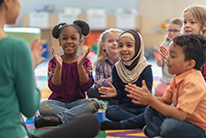
“We have to keep in mind that children on the move are first and foremost children and their rights move with them!” Dr. Najat Maalla M’jid, Special Representative of the United Nations Secretary-General on Violence against Children
A webinar series on Resilience and Children on the Move, took place from September to November 2021, gathering more than 350 participants in three sessions. Throughout the sessions, participants shared experiences and best practices to support, protect and nurture the physical, socio-emotional, and spiritual well-being of children on the move.
The recommendations and interventions from children on the move, faith leaders and faith actors, experts, and academic and civil society practitioners highlighted the importance of faith-sensitive mental health and psychosocial support approaches as a crucial factor to foster the resilience and well-being of children on the move, particularly during the COVID-19 pandemic. The discussions looked particularly at the role of faith communities.
“The opportunities and support offered by faith communities in my host countries India and Pakistan are one of the factors that helped me grow and achieve my goals in terms of education and allowed me to also contribute actively to the society.” Hayat, Refugee from Afghanistan
“Children on the Move” is an umbrella term used to define children who are migrating or are moving due to various reasons that could include conflict, poverty, violence, natural disasters, climate change, discrimination, or lack of access to education or other services. Children affected by forced migration and displacement are one of the world’s most vulnerable populations.
Typical mental health and psychosocial support (MHPSS) interventions do not incorporate children’s spiritual nurture as a pathway to resilience. Faith-sensitive MHPSS approaches play a crucial role in promoting the well-being of children on the move. Faith-sensitive MHPSS approaches can restore connections and relationships among children and adults and enhance a child’s sense of belonging and resilience capacity.
“Mental health and psychosocial support interventions provide children with spaces of relative safety and moments of joy and relief, where children can learn and socialize, where children on the move can just be children”. Ms. Rania Al Ayoubi, Founder Image for Education, Jordan
Building on the exchange of experiences, insights, and emerging practices, a booklet titled Faith Sensitive Mental Health and Psychosocial Support (MHPSS) to Foster Resilience in Children on the Move was developed. The booklet examines specific psychosocial support interventions that support, protect, and nurture migrant children’s physical, socio-emotional, and spiritual well-being.
This resource was designed to raise awareness about the effectiveness of faith-inspired psychosocial support frameworks to support the resilience and well-being of children on the move. It presents the specific mental health and psychosocial challenges affecting children on the move and how an integrated response—including MHPSS, spiritual nurture—might address some of those issues.
The booklet introduces emerging practices from local faith actors and young people that have proved effective to support the mental and emotional well-being of children on the move; and presents concrete recommendations to raise awareness about this topic among governments in host countries and donor governments, as well as humanitarian actors.
The three-part virtual series was developed by Arigatou International, the KAICIID International Dialogue Centre, and World Vision International in the framework of the Sustaining Peace and Health workstreams of the International Partnership on Religion and Sustainable Development (PaRD).
The organizations are active members of PaRD, a network that brings together governments and international organizations with diverse civil-society organizations that work with faith communities to engage the social capital vested in faith communities for sustainable development and humanitarian assistance.
We thank the distinguished panel of discussants, whose sharing of their research, practices, insights, and concrete recommendations on the topic made the whole process a rich and fruitful learning experience. We also thank the participants for their interest and commitment to children’s rights and well-being.
The post Fostering Resilience in Children on the Move appeared first on Ethics Education for Children.
01/03/2022 - The Solidarity Project Ends With the Launch of a Practical Booklet for Educators and Policymakers

A booklet titled Solidarity: Advancing the Role of Education in Fostering Migrant and Refugee Inclusion in Europe, was launched in November 2021 as part of a project to support educators and policymakers working with migrants and refugees in Europe.

This booklet aims to contribute to creating a new narrative of inclusion through education that moves away from the perception of a one-way relationship—whereby migrants and refugees must integrate into the host community—towards creating a reciprocal process of learning that increases the possibilities of harmoniously living together in plural societies. Inclusive education plays a critical role in this process.
The booklet builds on the reflections and recommendations collected during a series of three webinars that were organized in 2021 for educators working with children across Europe. Under the title Solidarity: An Ethical Imperative for Advancing the Role of Education in Migrant and Refugee Inclusion in Europe, the webinars aimed to create dialogue, raise awareness, and build capacity in the transformative role that education can play in enabling children from migrant, refugee, and host communities to learn to live together in solidarity.
A distinguished panel of experts guided and moderated the discussions, enriching the conversations with their valuable insights. The webinars were attended by 192 participants, whose knowledge and practical experiences contributed to the development of this booklet. The recordings of the webinars, resources and reports can be found HERE.
The Solidarity booklet is designed to be used by educators in formal and non-formal education settings working with migrants and refugees; policymakers who would like to learn about successful practices and the best ways to address issues of inclusion between migrants, refugees, and host communities through education, and all those who are interested in finding ways to support inclusive education either through research, advocacy, or informal programs.
The development of this resource aims to invite readers to reflect on the dynamics and main challenges affecting migrant, refugee, and host communities in Europe and to create awareness on the transformative role of education to foster learning to live together.
The booklet provides recommendations for the psychosocial support needed to ensure the social, emotional, and spiritual well-being of children and the creation of conducive learning environments. It empowers educators to use intercultural and interfaith learning through transformative pedagogical approaches that promote children’s well-being, social transformation, and capacity to learn to live together and provides recommendations for educators, schools, organizations working with migrants and refugees, and policymakers.
This project was a collaboration between Arigatou International – Geneva and Synyparxis, an ecumenical organization from the Church of Greece. The project was funded by KAICIID’s platform Network for Dialogue.
The post The Solidarity Project Ends With the Launch of a Practical Booklet for Educators and Policymakers appeared first on Ethics Education for Children.
01/03/2022 - Transforming Education – A Global Symposium on Ethics Education for Children

More than 900 educators, children and young people, policymakers, religious leaders, faith-based and civil society organizations, academic researchers, and multilateral agencies gathered online at the global symposium Transforming Education: Ethics Education for Learning to Live Together, which was held from 22 to 23 November 2021.

The Symposium provided a platform for various stakeholders including several Ministries of Education, to share experiences on ethics education programs and policies, and their contribution to peacebuilding and the 2030 Sustainable Development Agenda. Through a series of panel discussions and interactive workshops, participants learned from the experience, insights, and expertise of diverse partners working at national, regional, and global levels.
“Children and young people have taught us resilience, and they are also asking us to transform education to address the multiple ethical challenges our societies face and to help them prepare to be agents of change in building a better world,” stated Rev. Keishi Miyamoto, President of Arigatou International at the Opening Ceremony.
The discussions and workshops dwelled on the importance of recognizing the role of education in building safer, equitable, and inclusive societies. Education needs to support children’s sound and holistic development, not only cognitive and physical but also social, emotional, and spiritual. By nurturing in children ethical values, such as empathy, respect, and responsibility, and life skills such as critical thinking and the ability to solve their differences with others, children can learn to live together with people of different cultures, religions, and beliefs.
Participants explored how ethics education can empower children to become global citizens and work together to build peaceful societies.
The Transforming Education symposium was organized by Arigatou International – Geneva, the Guerrand-Hermès Foundation for Peace, the Higher Committee for Human Fraternity, ICESCO – Islamic World Educational, Scientific and Cultural Organization, KAICIID International Dialogue Centre, the Kenya National Commission for UNESCO, the Ministry of Education of Kenya, Religions for Peace, Scholas Occurrentes, the United Nations Alliance of Civilizations, and UNICEF, with the support of UNESCO.
The two days event was streamed in Arabic, English, French and Spanish, reaching participants from 80 different nationalities. More than 50 organizations were actively involved in the event, including faith-based and civil society organizations, multilateral agencies and 11 Government offices.

Judge Mohamed Abdelsalam, Secretary General, Higher Committee for Human Fraternity
Child Participation
To enhance children’s meaningful participation, an intergenerational dialogue between children, young people and adults was held on the second day, inviting reflections on how ethics education can help children learn to live together. Children shared their own recommendations about the role of education in enhancing opportunities for their participation and helping them to be part of the solutions to the problems in their communities.
“A school is a place where children grow and develop together with others and therefore it has a very important role in helping children learn about this diversity and appreciate their differences.” Sophia, a child from Indonesia.
This inter-generational session was preceded by a dialogue between more than 40 children from 10 different countries in Africa, Asia, Europe, Latin America, and the Middle East. The session aimed to reflect on how ethics education can help us to learn to live together. During the two-hour session, children had the opportunity to share ideas on how they imagine ethics education. The dialogue ended with the children putting together a manifesto with their recommendations which was shared during the Symposium.
Also, out of the 90 speakers that took the floor during the Symposium, 17 were children. This provided children with a space for safe and meaningful participation and gave participants the unique opportunity to hear children’s recommendations first-hand and to engage with them in dialogue.

Policy Brief: Advancing Ethics Education for Children to Contribute to the 2030 Sustainable Development Agenda
A critical result of the reflections and dialogues held during the Symposium was the identification of the key benefits of integrating ethics education into national policies and programs. The organizers developed a policy brief with concrete recommendations and programmatic actions on integrating ethics education as a core tenet of equal and inclusive education for children.
The policy brief Advancing Ethics Education for Children to Contribute to the 2030 Sustainable Development Agenda, outlines the importance of prioritizing and investing in ethics education in formal and non-formal education systems, to contribute to building more inclusive, respectful, and resilient societies, where children are equipped to respond to ethical challenges and become active citizens.

Ms. Paloma Escudero, Director, Division of Global Communication and Advocacy, UNICEF
Digital Products
As part of the Symposium, a call was open for organizations to share resources, programs, or research papers on ethics education for children, through Digital Products.
The best educational resources and programs to create safe and empowering spaces for children to learn to live together were selected and featured on the Transforming Education website. The selection includes global programs and resources as well as local ones coming from Austria, Bolivia, El Salvador, Kenya, Lebanon, Spain, Switzerland, the United Kingdom and the United States.
Launch of the Ethics Education Fellowship Program
One of the main outcomes of the symposium is the launch of the Ethics Education Fellowship Program for ministries of education to build a network of formal education institutions and create a platform for sharing and building capacity within the ministries.
Fellowship Program aims to strengthen capacity on ethics education in formal settings as a key contribution to developing national programs that foster learning to live together, and to promote a sustainable continuation and expansion of ethics education activities in the participating countries.
The Fellowship Program is a collaboration between Arigatou International, KAICIID Dialogue Centre, the Higher Committee for Human Fraternity, Guerrand-Hermes Foundation for Peace, Kenya National Commission for UNESCO and UNESCO Office for Eastern Africa. It will be formally announced in the first semester of 2022. A meeting with partners will take place in Geneva on 7-8 March 2022.
We thank our distinguished partners for believing in this project and joining us in the organization of the Symposium. Our sincere gratitude goes to the speakers and facilitators of the workshops who selflessly gave their time and shared their knowledge during each session. We also thank all the participants for their enthusiasm, and particularly children, for trusting us with their genuine thoughts, ideas, and recommendations.
The post Transforming Education – A Global Symposium on Ethics Education for Children appeared first on Ethics Education for Children.






